




chrIs NGuyEN / hEraLd
 BY OWEN DAHLKAMP AND KELVIN JIANG UNIVERSITY NEWS EDITOR AND POLL COORDINATOR
BY OWEN DAHLKAMP AND KELVIN JIANG UNIVERSITY NEWS EDITOR AND POLL COORDINATOR
Each semester, The herald conducts an undergraduate-wide poll to understand student opinions and campus lifestyle.
This semester, The herald surveyed 1,008 students between Feb. 27 and Feb. 29, inviting them to share their views on admission policies, student activism, substance use, politics and university administration. some of the notable findings of the poll are included below. you can explore the
data further using our interactive website. Admissions
Earlier this month, the university announced that it would reinstate its standardized test requirement next year for first-year students applying for undergraduate admission. The herald asked for students’ opinions regarding the test-optional policy before the change was announced. about half of student respondents approved of the test-optional policy that applicants had enjoyed since 2020. Black and Latinx students rated the policy more favorably than white and asian students. Those receiving financial aid and those who identify as first-generation students were also more likely to approve of the policy.
Previous studies have found that test-optional policies increased enrollment of students from underrepresented back-
GLO petitions for dismissed student amid OCR investigation
BY JENNIFER SHIM AND SAMANTHA CHAMBERS UNIVERSITY NEWS EDITORSsince Meg Wilson — a Phd candidate in the department of Earth, Environmental and Planetary sciences — was dismissed from her program in January, a group of students and members of the Graduate Labor union have petitioned for her reinstatement.
Wilson alleges the university retaliated against her academic accommodations by placing her on academic warning, failing to provide accommodations in a timely manner and restricting her access to Brown resources, among other claims. her allegations of disability discrimination are being investigated by the department of Education, The herald previously reported.
In a message to The herald, Brian clark said the complaint was “without merit.” he pointed to the department of Education’s January letter about the opened investigation, which stated that opening investigations does not indicate an evaluation on the validity of complaints.
Last Wednesday, Wilson and roughly 20 GLO organizers and community members met outside university hall to deliver a petition to President christina Paxson’s P’19 P’Md’20 demanding Wilson’s reinstatement. The petition currently has over 800 signatures.
Wilson and participants presented a copy of the petition to a secretary in the office of President christina Paxson P’19 P’Md’20. university spokesperson Brian clark later confirmed that Paxson received the petition in an email to The herald.
“Going public with the petition was a last resort, and I really wanted folks to under-
grounds. Others have found that reporting test scores benefits these same students.
In its findings, the university’s ad hoc committee on admissions Policies — the group that recommended the policy change — said that “strong testing, interpreted in context, may actually serve to demonstrate (applicants’) ability to succeed at Brown — and the lack of scores may mean that admissions officers hesitate to admit them.”
The committee also recommended further discussion regarding the preference for applicants with familial ties to the university. among arguments for keeping the policy, the committee claimed that the increased diversity of alumni who were admitted under an affirmative action paradigm will increase the diversity of legacy applicants. The committee did not
make a concrete recommendation, instead deferring any decisions until community input could be included.
No concrete plans by which to collect this input have been announced. White students were more likely to have legacy status at Brown than any other racial group, with 17% of white respondents having one or more parents who attended Brown. and nearly a quarter of all students who do not receive financial aid reported having family members who had attended Brown.
In an interview with The herald last month, President christina Paxson P’19 P’Md’20 said that if the university “were concerned primarily with socioeconomic diversity, it would make sense to eliminate
Third of tenured faculty at U. are women
Women make up 61% of non-tenure, non-tenuretrack faculty
UNIVERSITY NEWS EDITOR
at Brown, 32% of tenured full-time in structional faculty are women, according to data from the National Education time, women represent the majority of faculty who are either non-tenured or tenure-track full-time instructors at the u Tenure is an indefinite academic ap pointment meant to safeguard freedom of expression and protect scholars from political retribution. Faculty previously told The helped transform their teaching and scholarship and allowed them to per form additional
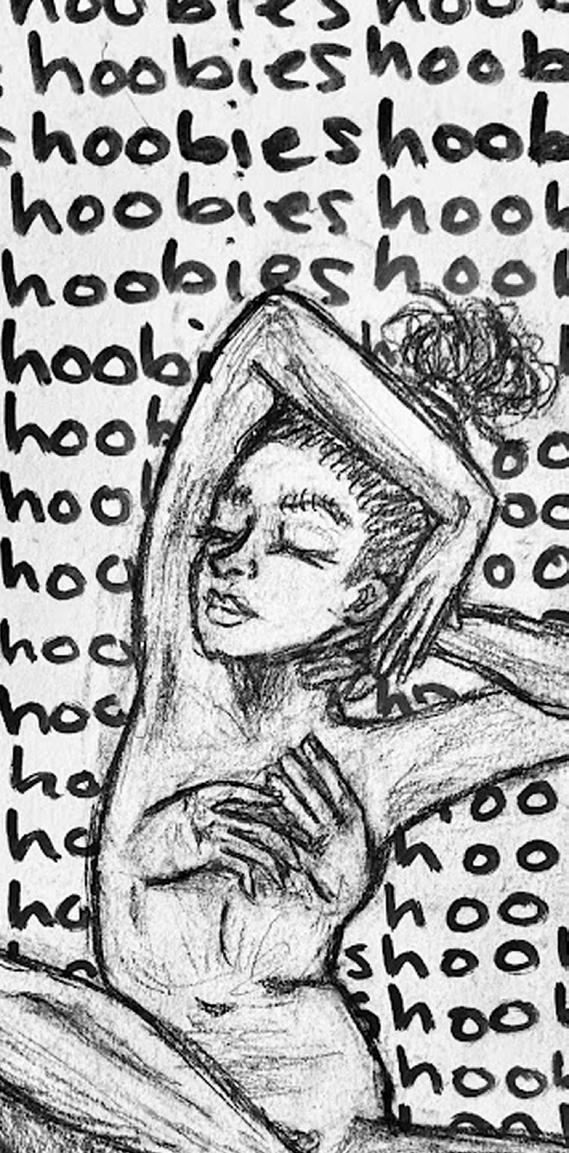
start their families.

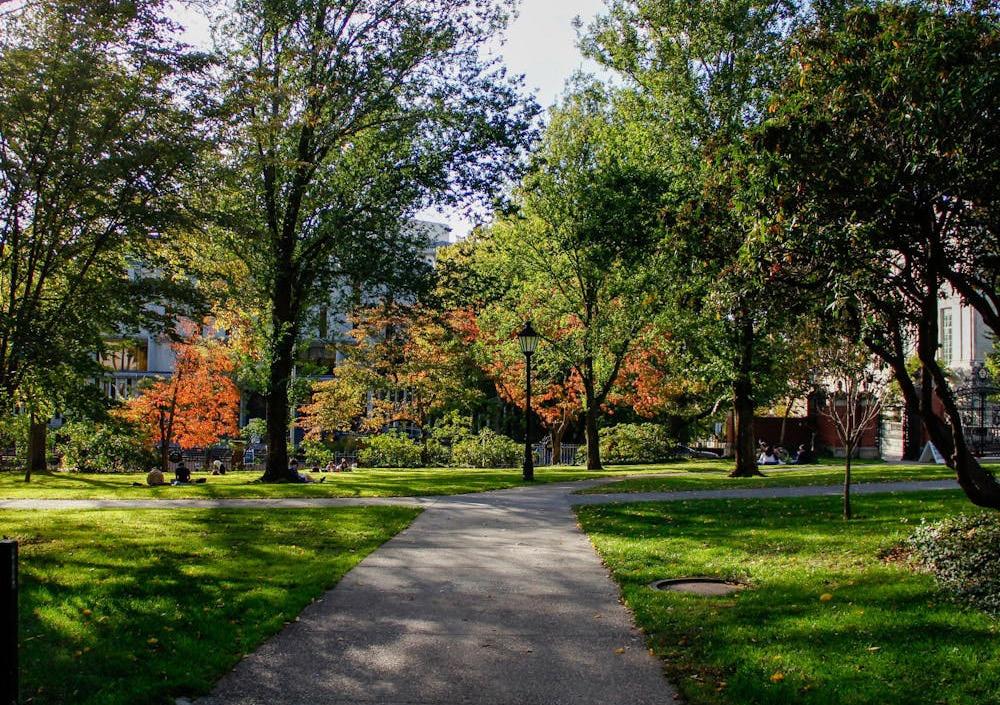
1
Virgina bans legacy admissions for all public colleges, universities
The law passed unanimously and will take effect this July. a ban on legacy admissions was implemented in colorado back in 2021, with other states like New york and connecticut considering a similar policy.
2 Princeton grad students call on Congress to help student kidnapped in Iraq
Princeton graduate students send letters to congress, hoping to bring attention to Ph.d candidate Elizabeth Tsurkov’s kidnapping by the shiite militia Kataib hezbollah in Iraq.
3 Fontbonne University in Missouri set to close next year
citing budget problems and dwindling enrollment, the 101-year old institution was unable to recover. Other higher education institutions have faced similar financial struggles in recent years.
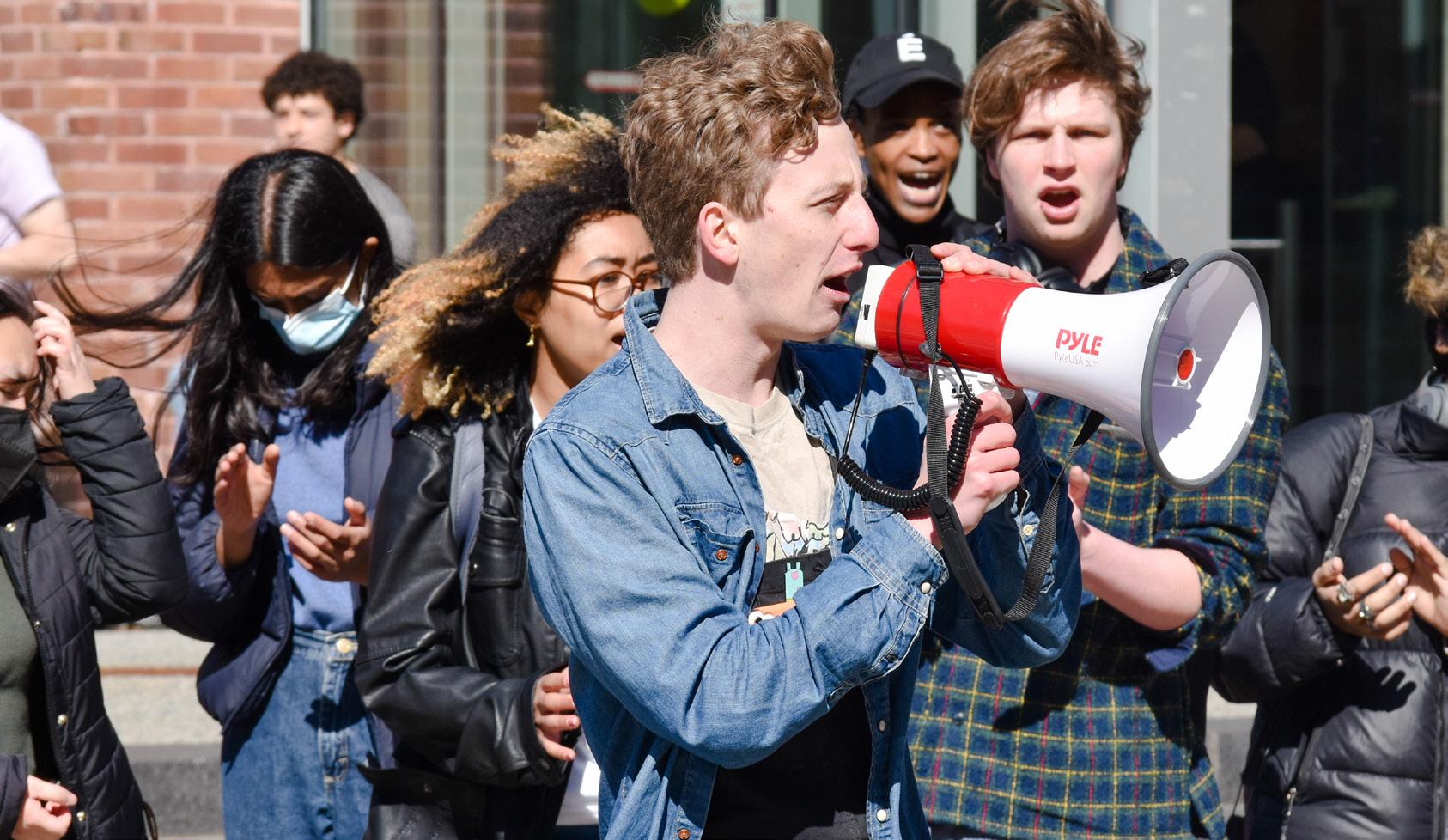
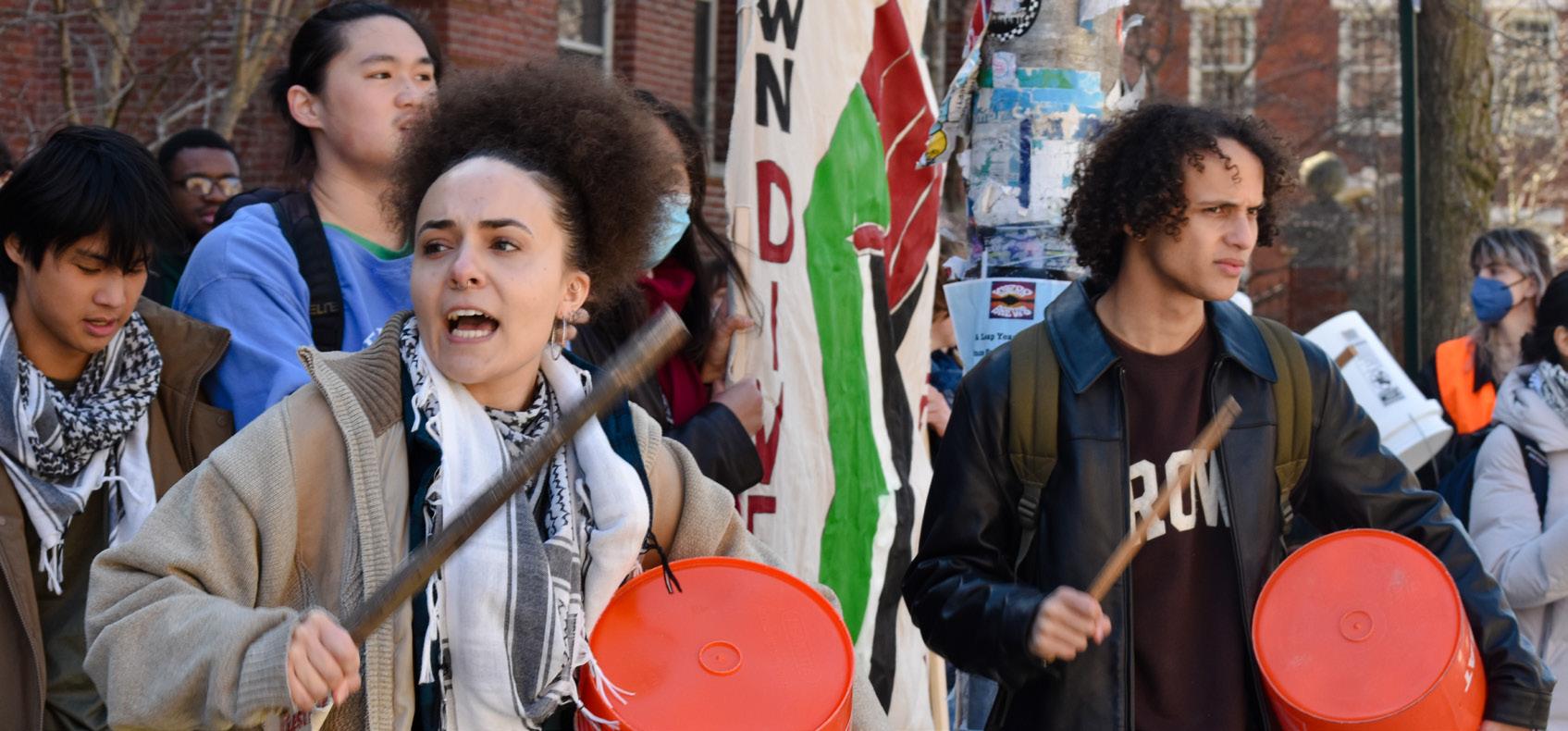
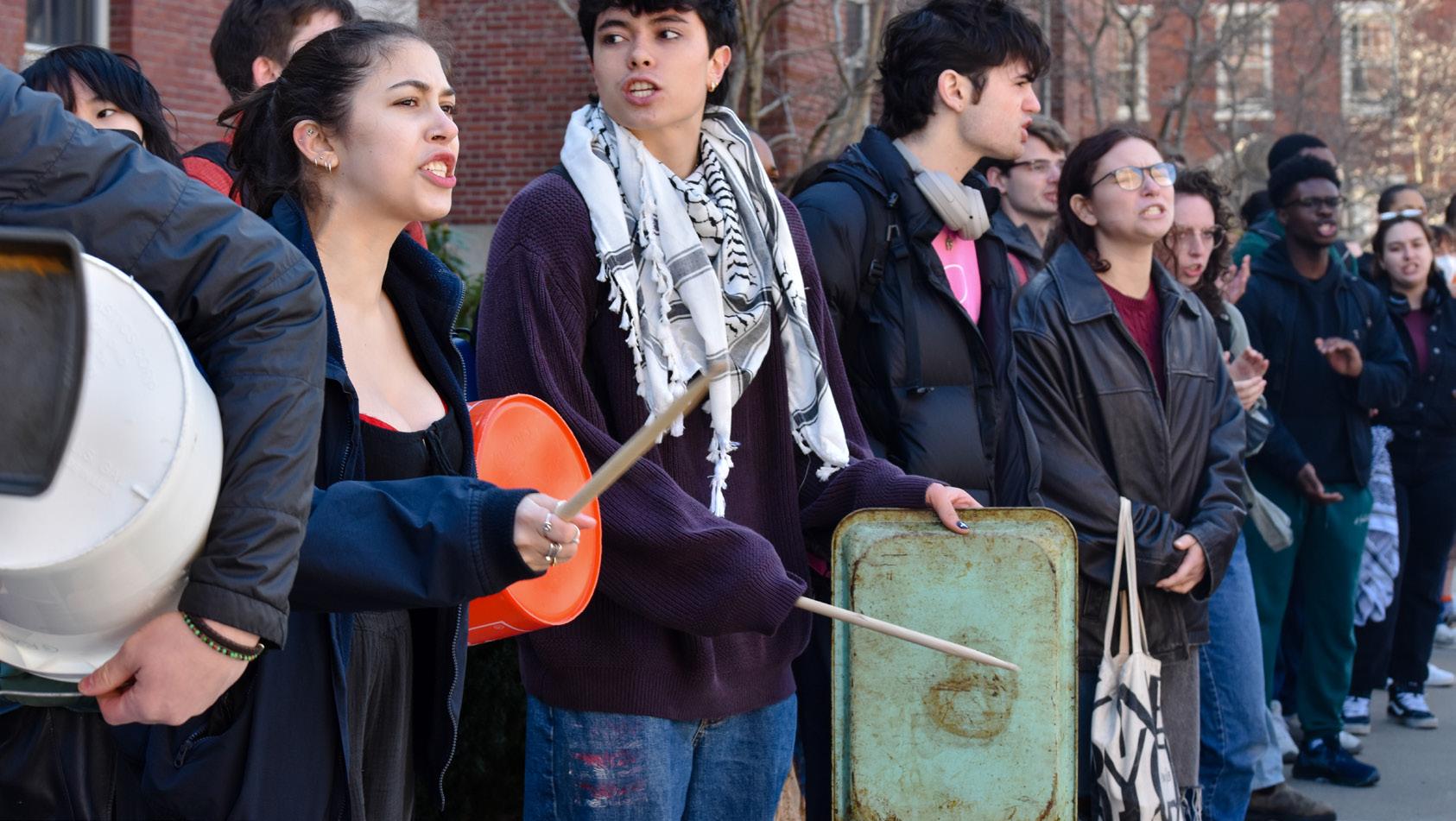

FRIDAY
“France and the Black Atlantic: Geographies of Slavery and Memory,” Stephen Robert ’62 Campus Center, 9:30 a.m. - 5:30 p.m.
Women’s History Month Lunch + Learn, School of Public Health (375), 11:45 a.m.
SATURDAY
“ALABASTER” by Audrey Cefaly, Pell Chafee Performance Center, 2:00 p.m.
“(Un)Real Housewives: Consuming the Viral Homemaker,” Stonewall House, 11:00 a.m. - 1:00 p.m.
SUNDAY
Workshop on “Daoist Style Meditation and Qigong,” Weiner Center, 12:30 p.m. - 5:30 p.m.
TENURE FROM PAGE 1
to examine the hiring, promotion and retention of women faculty. The Task Force’s findings and recommendations were published in april 2023.
The report highlighted the underrepresentation of tenure and tenure-track women faculty compared to national Phd graduates, as well as even lower representation of women from historically underrepresented groups.
diane Lipscombe, the chair of the Task Force and director of the carney Institute for Brain science, said in an interview with The herald that this disparity does not come from tenure rates, but from hiring.
The Task Force found that fewer women were hired than men, though they “did not find evidence for systematic biases against hiring women into faculty positions,” according to the report. The report suggested that Brown hire and promote more women faculty, improve work-life balance and ensure service is more equally spread across faculty.
Faculty service, one of the considerations for tenure and a responsibility of tenured faculty, disproportionately fell on women, reflecting national trends, the Task Force found. specifically, though there were “no systemic differences” in committee assignments or undergraduate advising, “as a group, women faculty do more service on university committees than men.”
This is because “a higher percentage of women serve on university committees compared to their representation in the general senior faculty population,” the report reads.
“Women faculty tend to be asked
more to do service work, again, because their senior faculty might view them as more approachable, helpful or more likely to say yes,” said Emily rauscher, a professor of sociology.
“On average, women and people who present as women tend to have higher advising loads because students tend to feel more comfortable approaching them for help,” she added.
In October 2023, another task force was created to implement the recommendations, which included improving retention and recruitment of women faculty in addition to eliminating the gender pay gap within five years.
Women faculty nationally across the country, women represent “only 44% of tenure-track faculty and 36% of full professors” yet comprise the majority of non-tenure-track faculty, according to the american association of university Women.
a 2023 study from the university of colorado at Boulder found that women left academia at higher rates than men. The study — which analyzed a national dataset of over 200,000 tenured or tenure-track faculty and surveyed around 10,000 faculty — also found that women were more likely to feel pushed from their jobs than pulled to better opportunities. Women faculty were more likely to leave or consider leaving because of workplace climate, rather than due to work-life balance concerns.
Katie spoon, the study’s lead author and a graduate student at the university of colorado Boulder, said she found this result surprising. “The gender reasons in the literature skew towards work-life
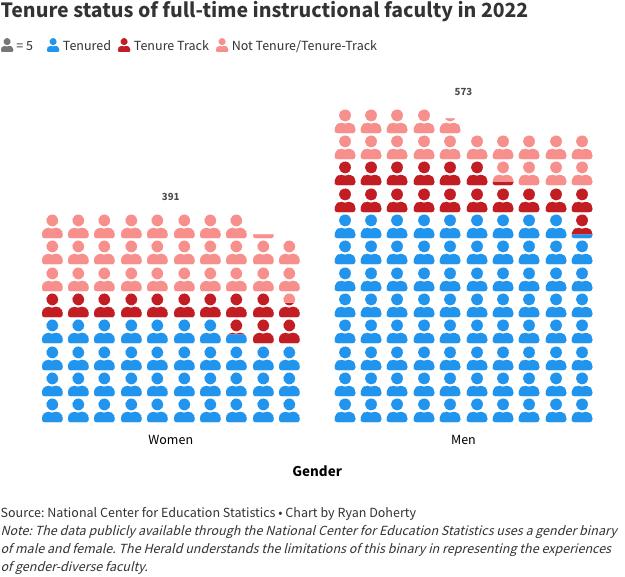
balance, which we found was more relevant for early career, but as we see the gender gap grow for later career faculty, we also see workplace climate become more gendered,” she told The herald.
The study defined workplace climate as “the way an academic feels around their colleagues, including dysfunctional departmental culture or leadership, harassment or feeling like they do not
belong or fit in their department.”
While women faculty were more likely to leave academia nationally, aaron clauset, a cu Boulder professor and the principal investigator of the study, noted that rates do not tell the full story.
“We don’t really care about the rates being exactly the same,” he said. “We really care about the reasons being exactly the same … if the reason women


General Managers
Benjamin Moshes
Alex Zhou
Sales Director
Samantha Sinensky
Finance Director Mason Mead
Office Manager Cary Warner

are leaving at higher rates than men is because it’s a toxic environment to stay in academia and they feel pushed out, then that’s the issue,” clauset added.
Editor’s Note: The data publicly available through the National Center for Education Statistics uses a gender binary of male and female. The Herald understands the limitations of this binary in representing the experiences of gender-diverse faculty.
Submissions: The Brown Daily Herald publishes submissions in the form of op-eds and letters to the
Op-eds are typically between 600 and 900 words and advance a clear argument related to a topic of campus discourse. You can submit op-eds to opinions@browndailyherald.com.
Letters to the editor should be around 250 words and respond to an article or column that has appeared in The Herald, or critique or commend The Herald’s editorial decisions. You can submit letters to the editor to letters@browndailyherald.com.
Submissions undergo multiple rounds of editing. These rounds of editing generally take place over the course of one evening, and you may have to respond to edits late in the evening. If you know you will be unable to do so, please mention that in your email, and we will do our best to work with you.
Submissions can build on reporting from The Herald, reporting elsewhere, official statements from the University or other groups and other reputable sources, but they cannot break news or contain information that The Herald cannot verify. Because we cannot publish unsubstantiated information, failure to provide appropriate sources may mean we have to modify or remove unverified claims.
The Herald will not publish anonymous submissions or submissions authored by organizations. Leaders of student organizations can be identified as such but cannot write under the byline of their organization.
The Herald cannot publish all submissions it receives and reserves the right to edit all submissions. All submissions to The Herald cannot have been previously published elsewhere (in print or online — including personal blogs and social media) and must be exclusive
Mifepristone was previously only available via in-person clinics
BY MAYA KELLY AND TOM LI SENIOR STAFF WRITER AND METRO EDITOROn March 1, cVs Pharmacy announced that it will start dispensing abortion pill mifepristone in its rhode Island and Massachusetts locations.
Mifepristone is the first drug in a two-step abortion treatment, which also involves taking a second medication misoprostol. The two-step regimen is 94% to 98% effective for pregnancies lasting up to eight weeks, according to Planned Parenthood. The efficacy of the treatment decreases as the pregnancy continues, with an 87% efficacy rate at 11-weeks pregnant.
While misoprostol can induce abortion by itself, it is more effective when taken alongside mifepristone. In legally permissible states, misoprostol is also available in pharmacies and accessible via a prescription, whereas mifepristone could previously only be obtained at licensed medical facilities.
The in-person dispensing requirement was removed by The Food and drug administration in January 2023, The herald previously reported. The decision established a “pharmacy certification process,” which evaluates retail pharmacies to allow them “to dispense mifepristone directly to patients who have a prescription from a certified prescriber,” according to the Fda advisory.
“We’ve received certification to dispense mifepristone at cVs Pharmacy and plan to

The Food and Drug Administration first removed in-person dispensing requirements for mifepristone in January 2023.
fill prescriptions for this medication in states where legally permissible,” wrote amy Thibault, director of external communications for cVs Pharmacy, in a statement shared with The herald. according to the statement, cVs plans to expand its dispensing of mifepristone to other states, as permitted by law.
Medical abortion is legal in 36 states and Washington, d c. The 14 remaining states have explicit bans against it. In 2020, over half of the abortions in the united states were conducted through medication, according to research conducted by the Guttmacher Institute, which advocates for the advancement of
reproductive rights.
This month, the supreme court will hear oral arguments on the case alliance for hippocratic Medicine v. Fda. The case originally challenged the constitutionality of medical abortion altogether. In december, the court stated that it would only hear arguments on the protection of policies expanding access to mifepristone.
according to Benjamin Brown ’08 Md’12, assistant professor of obstetrics and gynecology at the Warren alpert Medical school, “mifepristone has long been subject to medically unnecessary restrictions on how it can be prescribed and dispensed,” he wrote in an
email to The herald.
“These barriers to care are not based on science, and at the end of the day, they can prevent people from getting the care they need,” Benjamin Brown added. “retail pharmacy dispensing of mifepristone is one key step to helping people access this essential health care in the way that’s right for them.”
diversifying ways to access abortion care serves as an important step to destigmatizing reproductive health, according to Naomi Ninneman, associate director for empowerment and prevention at BWell health Promotion. “stigma very often gets in the way of
KENNETh rhEE / hEraLd
people being connected to the services and resources that would be most appropriate or beneficial for them,” she wrote in an email to The herald.
Ninneman added that the university has introduced free emergency contraception and outreach to inform students of “the breadth of sexual and reproductive healthcare that is available to them.”
“at the end of the day, retail pharmacy dispensing of mifepristone is a critical step toward more patient-centered, accessible abortion care,” Benjamin Brown said. “I’m grateful to know that my patients will have this option available to them.”
Teachers discuss application process, potential career flight, layoff fears
BY CIARA MEYER SENIOR STAFF WRITEROn March 1, the Providence Public school district formally notified 367 teachers that they would be displaced for the coming school year, meaning that the teachers will need to find another placement in the school district. In a letter shared with The herald, deputy superintendent Zack scott informed recipients that “difficult decisions” would continue to be made throughout the spring.
In the letter, scott noted that the district is facing “financial challenges … driven by the expiration of federal funds and nationwide declines in enrollment.”
While PPsd Public Information Officer Jay Wegimont wrote in an email to The herald that no existing classroom positions were funded by cOVId-19 relief funds, he stated that federal funds were used to “onboard additional support staff.”
For Maribeth calabro, president of the Providence Teachers union, future layoffs are a concern. “We’ve had conversations for several months about the fiscal cliff, and how that may impact staffing,” calabro said. “The commissioner has said there may be layoffs.”
When asked about the future of displaced teachers, Wegimont wrote that “we do expect most displaced teachers to have new roles within PPsd next year.”

he added that the teachers will be given preference over other applicants when applying to other positions in the district.
calabro explained that the cause for displacement varied from person to person. some teachers, like those at 360 high school, were displaced due to school closure. Others had failed to complete emergency certification requirements. a large number were displaced due to position restructuring. reading and math coaches, for example, are being merged into a general coach role for next year, calabro said.
“We went from potentially two coaches at every elementary school down to one,” she added.
But that doesn’t mean half of those coaches will be laid off. according to the Providence Teachers union contract, layoffs will be conducted based on “seniority within area of certification” if they occur.
“coaches who have an elementary certification may not necessarily be laid off,” calabro said. “It may be a least senior elementary person who is laid off.” communication around displacements also varied. While all teachers received their formal notices on March 1, those at 360 knew they would be at risk when their school closure was announced, said alejandra Lindstrom Peralta ’12, a displaced art teacher from 360. “Feb. 6 was when we found out our school was closing and we would be displaced,” Lindstrom Peralta said. “We didn’t get any sort of email or letter until … we got our official displacement letter.”
The application system for a new position is also challenging, Lindstrom Peralta added. according to her, “some positions are posted twice and you have to apply to both of them to be able to even get an interview.”
calabro fears that teachers will leave the district due to job insecurity. The risk of losing teachers “keeps me up at night, every night,” she said. “I think that this whole thing may cause us to lose some really outstanding educators again, and so that’s very frustrating.”
Wegimont did not respond to specific questions about a potential teacher flight.
PP sd has also struggled with a teacher shortage for years. “The teacher shortage is very real, particularly in Providence,” calabro said. “The problem is that the shortages are in areas that are hard to fill.”
Teachers operating in these “hardto-fill” staff positions — such as math or special education — are less likely to face layoffs. still, dozens of teachers in such positions were displaced. “We’re still questioning as to why they’ve consolidated or displaced (hard-to-fill teachers) to begin with,” calabro told The herald.
While Wegimont did not directly state why those positions were displaced, he responded by emphasizing that displacement does not usually result in a layoff. “Last year, 233 displacement letters were issued, and no layoffs were actually made by PPsd,” Wegimont wrote.
“Teachers that remain displaced 15 days prior to the start of school will be given an assignment by the Office of human resources,” Wegimont added. Lindstrom Peralta noted that teachers can be placed in vacancy assignments for positions they are not certified to teach.
as of now, a total of 311 job positions have been posted for the 2024-25 academic year, according to Wegimont. certain subject areas have a large discrepancy between the number of displacements and the number of available positions. “For art, it’s not a great outlook,” Lindstrom Peralta said. While 14 art teachers were displaced, only seven positions have been posted.
Lindstrom Peralta added that many positions require teachers to split their time between two schools.
according to the Providence Teachers union contract, displaced teachers are required to apply for a minimum of five positions. Lindstrom Peralta only received one interview out of the ones she applied for. she also interviewed for a job outside of the district.
“Leaving the district means you would definitely take a pay cut because the salaries for Providence are higher than … private or charter,” she said. she also cited healthcare benefits and a dedication to PPsd students as reasons to stay in the district.
“We’re still talking about a bunch of kids who need someone at school who’s there and cares,” Lindstrom Peralta added.
More positions could be posted over the spring and summer. The statutory deadline for layoffs is June 1. until then, “PPsd will continue to monitor our staffing and budget projections throughout the spring to determine if any additional staffing changes are needed,” Wegimont wrote.
Resolution follows three deaths on North Main Street in the past year
BY INJY EL-DIB STAFF WRITEROn Feb. 21, Providence Mayor Brett smiley endorsed Vision Zero, a commitment to “redesigning city streets for the safety of all who walk, bike, ride and drive,” via a city council press release. The mayor seeks to eradicate “traffic fatalities and serious injuries by 2030,” Press secretary Josh Estrella wrote in an email to The herald.
Ward 3 councilwoman sue anderbois said that the endorsement came after three “likely preventable” pedestrian fatalities on North Main street during the last year alone. “That is an unacceptable … lack of safety, and we need to address that immediately,” she said.
anderbois said she created the North Main street Task Force in October 2023 to address the “immediate safety issues” plaguing Providence roads, she said. But the issue of traffic safety isn’t particular to North Main street — “it’s happening all across the city,” she added.
In an October 2023 task force meeting, anderbois called on the Providence streets coalition, an organization advocating for “people-friendly streets,” to present data they collected on crashes in Providence. The Providence crash data project spanned the years 2010 to 2022 and recorded over 3,600 crashes. anderbois attributed the passing of Vision Zero to the presentation, which she described as “compelling.” The resolution was developed
ON COLLEGE HILL
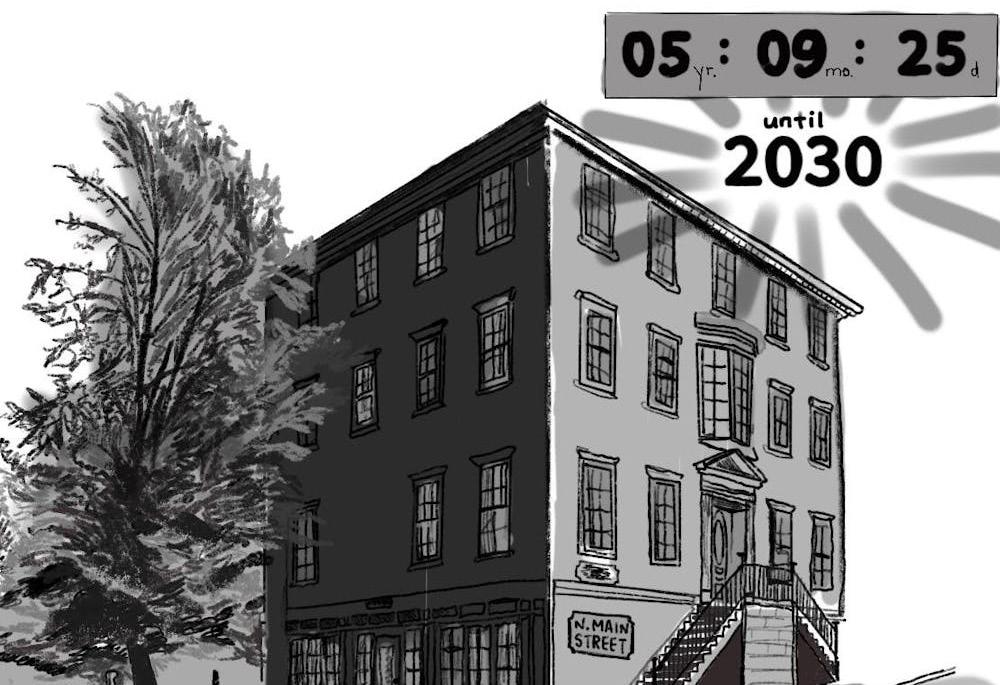
in cooperation with the “mayor’s chief of policy, as well as the sustainability Office and the Planning Office,” Estrella wrote.
Funding for Vision Zero “will come from a wide variety of sources, including federal safe streets and roads For all funding,” according to Estrella.
since passing the resolution, Providence has begun installing leading pedestrian intervals — which allocate a separate time for pedestrians to cross the street without cars turning right or left — throughout the city, Estrella wrote.
Liza Burkin, the coalition’s lead organizer, said retiming the signals this way allows the traffic patterns to be “more responsive to the needs of pedestrians rather than the convenience of drivers.”
Estrella added that the smiley administration is investing in additional pedestrian safety improvements, including “multimodal infrastructure” and enforcement of traffic laws.
anderbois noted that the increase in
ticketing across the city is not “the long-term solution,” but that she appreciates “that folks are trying to use whatever tools that they have right now.”
Burkin, on the other hand, said that increasing enforcement is “not an equitable approach,” adding that funds used to pay police officers to “sit on the side of the road” and issue speeding violations could be better used elsewhere.
according to Estrella, “there will be many opportunities for community input into the plan through the Green and complete streets advisory council” and additional engagement opportunities.
The North Main street Task Force is also interested in improved street lighting, according to anderbois. Burkin is interested in collecting data on pedestrian volume, but said she recognizes logistical and privacy concerns associated with implementation.
Burkin also described herself as a “big supporter of daylighting,” which involves “removing street parking near crosswalks
and intersections with physical barriers that prevent parking,” and has been associated with a decrease in traffic deaths in some cities.
Both anderbois and Burkin highlighted the importance of redesigning roads to incentivize compliance with the speed limit “If it’s comfortable to drive fast, you’re going to drive fast, and if it’s uncomfortable to drive (fast) — if you’re going to hit a speed bump, or there are trees overhanging or parked cars obscuring your view, you’re going to drive slower,” Burkin said.
North Main street in particular “is a very complicated street,” anderbois said. she explained that the road itself and the traffic lights are owned by the rhode Island department of Transportation, but the streetlights are owned by the city and the road is zoned for city businesses. she also added that the median strip is managed by the Providence department of Parks.
Because of this “complicated patchwork of stakeholders,” implementing interventions can be difficult and require jumping through multiple hoops, she said.
Burkin pointed to the state department of Transportation as the “main barrier is the political will” for implementation.
“The city council and Mayor smiley both seemed sincerely interested in fixing this problem and following the federal guidance and best practices, whereas the state has shown zero interest in doing anything to resolve the crisis, which is taking place mostly on state roads in the city,” Burkin said.
charles st. Martin, rIdOT chief public affairs officer wrote in an email to The herald that “rIdOT invests tens of millions
of dollars annually statewide in engineered safety improvements, public service messaging and the funding of dedicated police enforcement efforts to address many specific highway safety concerns, including impaired driving, speeding, distracted driving and failing to buckle up.”
“This includes funding more than 100 community organizations devoted to reducing fatalities and serious injuries caused by crashes,” st. Martin added. “In the past year alone rIdOT budgeted approximately $30 million for these efforts.” Martin additionally shared that rIdOT has a representative on the North Main street Task Force.
according to anderbois, rIdOT will collaborate with the task force in april to conduct “a road safety assessment” of North Main street. “Even though this is a state road, the city making the city-wide commitment to Vision Zero is going to have a direct impact on our work on North Main street,” she said.
Burkin also highlighted the importance of “making walking, biking and transit more competitive with driving,” and added that “the ultimate goal is to just increase the choices that we have.”
a car-dominant system is “also a big environmental issue,” anderbois said, adding that if driving remains the only real option for getting around, “we will continue to see transportation being the highest source of carbon emissions in the state.”
Burkin stressed that shifting away from a car-dominant system is beneficial to local economies, public health, equity and the environment.
New cafe to offer traditional coffee beverages, grab-and-go food
BY TOM LI METRO EDITORNext month, one of the newest dorms on campus will see a new, caffeine-centric addition: hazel Origin coffee.
The family-owned coffee company is set to open its Brook street location in the second week of april, co-owner dulce Lopez told The herald. The new cafe, which will be their second location, will be located on chen Family hall’s ground floor.
The university first announced hazel’s college hill arrival in an aug. 9 press release, The herald previously reported. Owned by Lopez and her husband, hazel Origin coffee offers traditional coffee beverages — with beans sourced from various central and Latin american growers — alongside grab-and-go food selections. The added space will also feature a variety of indoor and outdoor seating arrangements.
The Lopezes immigrated to the united s tates in 2022 after several years of experience in the coffee industry. The pair opened hazel’s first location in Pawtucket last October.
In september, Lopez shared that they expected the university’s branch of the store to be open by mid-November. h owever, contracting and inspection difficulties caused significant delays.
sourcing an affordable contractor
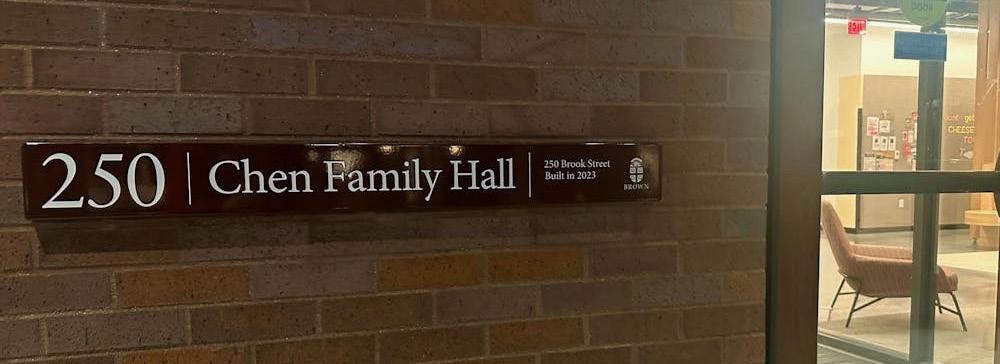
ryaN dOhErT y / hEraLd
to conduct renovations in the space posed a significant obstacle to opening, as bids and proposals were “three to four times higher” than anticipated, according to Lopez.
Lopez also added that the selected contractor runs their own family-owned business and, due to personal reasons, had to delay the renovation for several weeks.
as construction of the cafe nears completion, hazel’s owners now enter the final step of assembling and decorating the space.
“The espresso machine, everything that is going there — we already have it here in our Pawtucket location,” she said “We are just waiting for them to finish the project, and then we can start assembling everything in there.”
Before then, the new location must
pass its last inspection by the city of Providence this Wednesday. “Once they approve everything, we can finish the project, the final details and everything else,” she said.
These next few weeks mark the end of a 16-month-long journey for the Lopezes. The couple first entered conversations with Brown in december 2022, when the Brook street residence halls were still under construction, they shared.
“Once we toured the retail space that Brown was building, I knew we had to have it,” Lopez said in the august press release. From there, the couple presented their proposal to university administrators.
“a s early as the first conversation, it was clear to us that (the Lopezes have) a deep dedication to the
craftsmanship of coffee,” said John Luipold, Brown’s vice president of business affairs, auxiliary services and real estate in the press release. “The wholehearted approach they take to everything about their business will create an exceptional coffee experience for c ollege hill students and residents.”
a ccording to Lynda c urtis, the university’s media relations manager, hazel signed a lease agreement in the summer of 2023. “Management of the physical space was turned over to the company in July,” she added in an email to The herald. “We’re excited to see the results soon.”
Talia reiss ’27 is also excited about the new shop, pointing to its indoor and outdoor spaces. “I am someone who needs to switch up my study spac-
es frequently, particularly if I’m doing creative work — and I often am,” she wrote in a message to The herald. “I’m excited at the possibility of new cozy environments to add to my rotation.”
hazel also provides new opportunities for student employment. Interested students wishing to work for the shop can do so in the coming weeks through part-time employment opportunities, according to Lopez.
“The whole team at hazel is very excited to open the shop,” Lopez added. “We can’t wait.”
This article originally appeared online at browndailyherald.com on March 12, 2024.
WOMEN’S
TENNIS
Vs. BryaNT W 6-1
Vs. FOrdhaM W 5-2
Vs sT. JOhN’s W 4-0
LACROSSE
Vs. BOsTON W 21-9
BASKETBALL
Vs yaLE W 76-57
GYMNASTICS
Vs. BrIdGEPOrT
MEN’S
BASKETBALL
Vs yaLE W 84-81 (OT)
LACROSSE
Vs. MaryLaNd L 14-13 (OT)
HOCKEY Vs uNION L 6-0
BASEBALL Vs daVIdsON W 16-13
Vs daVIdsON L 12-5
Vs daVIdsON W 7-6 (7 INN.)
FENCING
There were only 0.2 seconds remaining in the men’s basketball game against Yale when Aaron Cooley ‘25 shot the winning three-point shot
There were seven seniors celebrated and recognized on Senior Day for women’s gymnastics.
The women’s tennis team won against three other teams this weekend --- Bryant, Fordham and St. John’s.
stand the severity of my situation,” Wilson wrote in a message to The herald. “accountability is key, and if Brown’s internal procedures fail you, you can still get help.” representatives for the department of Earth, Environmental and Planetary sciences, where Wilson was enrolled, didn’t respond to multiple requests for comment on Wilson’s allegations or the Education department investigation.
“Brown is deeply committed to sustaining a campus in which every student can fully participate in academic and co-curricular activities, and routinely provides accommodations for students with disabilities to ensure equitable access to courses, services and programs,” clark said.
documents and email correspondence reviewed by The herald show how Wilson navigated lengthy accommodations processes while attempting to fulfill her program requirements.
The January letter from the department of Education reviewed by The herald notified Wilson that the department’s Office of civil rights, or Ocr, would investigate three out of five allegations related to disability discrimination and retaliation during her time in the dEEPs graduate program.
On sunday, the fencing team took up arms at Brookville, New york in the Ncaa Northeast regionals. despite having some of the lower-seeded duelers, the Bears managed to bring home some surprising upsets and qualifications for the Ncaa championships. The day opened strongly for the Bears on the epee with dasha smuk ’26 — who was named one of last year’s First Team all-stars in the Northeast Fencing conference — winning all four of her matches in her pool, putting her through to the second round. smuk managed to make it through the second round with a record of 3-3, a far cry from the previous dominant form that the 35th-seeded fencer had posted.
In the third round, smuk only managed a single win against harvard’s Isabella chin, who would go on to place third overall. despite not making it to the final round, smuk managed to jump the seedings from her initial 35th place to a respectable 19th place overall.
alongside smuk were her teammates arianna Baffa ’24 and amy Mao ’27, who started the day seeded 42nd and 32nd, respectively. Baffa managed to climb the seedings up to a 37th-place finish, but Mao dropped to 38th in the epee.
In the saber, the Bears had their first exemption. alexandra Tzou ’26 — who finished 16th at this same competition last year — and rebecca Whang ’25 were the only Bruno fencers to be exempted from the first pool throughout the whole competition. They ended the day ranked 10th and 21st, respectively.
Just behind them in the rankings were alyssa sun ’26 and soph Bililies ’27 at 32nd and 33rd, respectively, forcing them to take on the first pool.
Bililies put on a dominant performance in her first pool, winning all four matchups
The Ocr dismissed Wilson’s claim that the university had discriminated against her based on her disability status by issuing an academic warning.
Wilson also claimed that Brown placed higher expectations of academic standing on her by requiring that she submit a chapter for publication in an academic journal. The department later clarified that Wilson did not need to fulfill this requirement, so Ocr also declined to investigate this claim.
The department of Education is currently investigating Wilson’s claims that the university threatened her funding after providing her accommodations, restricted her access to resources such as lab access and advising, and did not provide appropriate communication regarding her accommodation decisions.
Title III of the americans with disabilities act “prohibits discrimination on the basis of disability in the activities of places of public accommodations” — including privately-funded universities. In addition, under section 504 of the rehabilitation act of 1973, colleges receiving federal funds including Brown must protect students with disabilities.
Wilson, who was registered with student accessibility services, first faced an academ-
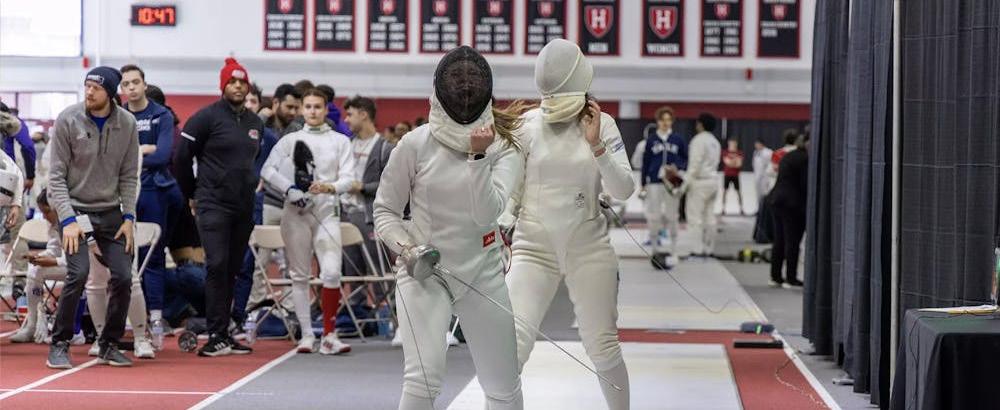
and out-touching opponents 20-9. sun also had fun in the first, taking home wins in three of four matchups. They both qualified for the second pool alongside their exempted teammates.
sun went on to only win two matches in her next pool, dropping her out of the competition.
Bililies continued her dominance, winning five out of six matches in her pool. Whang also showed up for her first action of the day in a big way, taking on six opponents and bringing all six down. The sabreuse only allowed 20 touches and managed 30 of her own to take home huge wins for the Bears.
coming out of this round, both Bililies and Whang improved their placements from 33rd and 21st to fifth and third, respectively.
Tzou won four of six in the pool, advancing to 14th place.
d espite dominating in the first two pools, the Bears seemingly hit a wall in the third. Between their 18 bouts, they only took home five wins, and Bruno was swept out of the saber. Tzou finished at 15th, Bililies in the 17th position and Whang in her original 21st seeding.
despite some of the early momentum carried by Bruno’s fencers, they frequently failed to convincingly finish. That changed during the foil.
Like in the epee, the Bears had no duelers exempt from the first round. But the ranked fencers were not prepared for the
ic warning in May 2023 due to “insufficient progress in (her) research,” according to a letter from her advisor. The letter outlined new thesis requirements for her to meet by aug. 11.
In early June, she appealed the academic warning in a letter. she later requested an extension of the academic warning on the basis of her disability, which was initially denied and successfully appealed.
after an initial rejection and successful appeal, Wilson received an approved accommodation letter on aug. 10, one day before the original deadline in her academic warning.
The accommodations gave her the option to extend the deadline by more than four weeks to sept. 15. Wilson’s funding status would depend on work she submitted before aug. 11. If that work was deemed insufficient, she’d lose funding until her additional work was reevaluated, after the sept. 15 deadline.
Wilson alleges that this constituted discrimination because the university did not guarantee ongoing funding if she accepts the accommodations. The Ocr is currently investigating her claim.
Wilson claims she lost access to her lab on aug. 14. a day after, Wilson’s advisor told
rise of anika Breker ’24 and Jessie chen ’27. chen and Breker were ranked 23rd and 26th respectively, forcing them to compete in the opening pool. The women’s foil was the most populated competition, with 58 fencers bidding for the podium.
“My season was okay, but unfortunately I was dealing with the fallout of a back injury during the first half of our season which affected my performance,” Breker wrote in an email to The herald. “as a result of that, I would say that the regular season rankings weren’t super reflective of my ability level.”
Both chen and Breker walked their way through the first pool, taking down all 8 of their opponents in clinical fashion.
“Going into regionals, I knew regardless of where my initial seeding was, it was going to be an uphill battle just by the sheer number of bouts and the level of competition that is in our region,” Breker added. “We have five of the eight Ivies in the northeast division, as well as several other d1 schools like (st. John’s university) and (Boston college). I would say my mindset going into it was just taking it one match at a time.”
They both then went on to win five of six in the second bouts, qualifying for the third pool.
But “you can’t be thinking about the round of 12 before you make it out of the first pool,” Breker wrote. “I think making it out of the last play-in round and into the pool of 12 meant the most to me because
her to secure advising from a different faculty member, according to an audio recording reviewed by The herald.
These actions, among others, amount to retaliation against Wilson for requesting accommodations, she alleges. The Ocr is investigating these claims.
Wilson received a letter on aug. 31 informing her that she’d remain on academic warning in fall 2025. In late October, she received another set of thesis milestones required by dec. 15. If she did not submit documents of sufficient quality by then, she would be dismissed within a month, the letter said.
“I had exhausted every resource, every office that Brown had for support. I received either no help, or extremely limited help,” Wilson wrote in a message to The herald on her decision to submit a complaint to the Ocr . “There were a few individuals who wanted to do more, but were unable to. The (department of Education) was the only group left who could help me.”
On Jan. 3, after Wilson contacted the Ocr , she received a letter from dEEPs, reviewed by The herald, communicating that she had been terminated from the Phd program. according to an email from a dEEPs representative, the department’s committee
that was where I had been knocked out in my sophomore and junior seasons.”
Both Breker and chen made it to the final “round of 12,” where they faced each other.
“Those bouts are always tough because you’ve been training with them the whole season and of course you want to support them and hope that they do well too,” Breker wrote.
Breker’s seniority shone through as she defeated chen, taking her first win of seven — earning her eventual fifth-place finish. chen took home six wins to earn eighthplace.
“I’m very proud of our women’s fencing team and their courage and determination at perhaps the most difficult national qualifying tournament in the country,” head coach alex ripa said in an interview with Brown athletics. “They performed beyond expectations, and I hope we may have qualified two athletes to Nationals. What a great way to cap off our season.”
after this weekend, both Tzou and Breker were selected to compete in the 2024 Fencing championships.
“Overall, getting to Ncaa championships has been one of my goals since before I even got to college, so to achieve that goal is really amazing,” Breker wrote.
This article originally appeared online at browndailyherald.com on March 12,
voted unanimously that Wilson had failed to meet the requirements to continue in her program.
Wilson appealed the university’s decision on Jan. 12, claiming factual inaccuracies in the dismissal letter and demanding to be reinstated to the program in good academic standing. she is currently “filing a grievance against my department and the university’s handling of this,” Wilson said.
Neither representatives from the university nor dEEPs responded to comment on Wilson’s allegations nor the investigation, citing the federal nature of the case.
andrew clark Gs, communications director for GLO, alleged that Wilson was “denied accommodations that she needed,” impacting her ability to conduct her research.
according to an email from a department of Education representative to Wilson, the Ocr is currently analyzing “an initial production of data and information” from the university as part of their investigation.
“I really do love this university. I’ve been so proud to be a Brunonian, and the research opportunities that dEEPs has given me have been so incredible,” she wrote. “all I am asking for is the opportunity to do the work.”
Additional reporting by Maya Nelson
Bears’ season comes to crushing end with 6-0 loss
BY COOPER HERMAN SENIOR STAFF WRITERIn a brutal season finale that head coach Brendan Whittet ’94 labeled a “short-handed” effort, the men’s hockey team (8-19-3, 6-14-2 Ecac) lost to sixth-seeded union (16-16-3, 9-10-3 Ecac) by a score of 6-0 in the first round of the Ecac playoffs.
saturday’s showdown in schenectady, N.y. was the third meeting between Brown and union this season, with the two teams splitting their matches in the regular season. On saturday, the Garnet chargers broke the split and bested Bruno.
“Our biggest struggle saturday was failing to get the first goal,” wrote forward Tyler Kopff ’27 in a statement to The herald. “We generated a bunch of chances early but failed to execute, and as a result the game just got away from us,” he added.
In spite of the game’s final score, the first period was fiercely competitive. Brown’s offense came out firing, slapping five shots at the union defense in a span of merely 90 seconds. defensively, the Bears also started strong, withstanding union’s juggernaut of an offense as the home team fired back four shots of their own between the 5:23 and 5:43 mark. Brown goaltender Lawton Zacher ’27 and company stood tall.
But at the 14:57 mark, the Bears’ defensive stand came to an abrupt end. Multiple Brown and union players fought for the

puck in a traffic jam, inadvertently sliding the puck into the stick of union forward caden Villegas. Villegas immediately fired it past Zacher and into the left side of the net, which put the Garnet chargers up 1-0 after one period.
The second period was more of the same for the Bears who, despite finding some offensive opportunities, could never convert them to goals. Perhaps Bruno’s most promising opportunity to strike back came at the 6:00 mark when union’s Nick young was given a penalty for interference — yielding Brown a power play.
But despite being short-handed, roughly 90 seconds later, it was the union offense
that struck again. Garnet charger forward dJ hart crept slowly toward the goal with his stick ready and, as soon as he received a sharp pass, blasted the puck behind the Brown defense to extend the union lead.
down 2-0, Bruno forwards worked hard to find their groove and put pressure on union’s defense. In an encouraging fast break at the 9:27 mark, Gavin Puskar ’24 obtained the puck and launched it at the union goaltender. But much to the Bears’ disappointment, union goaltender Kyle chauvette knocked Puskar’s shot down with his glove and into his body.
roughly a minute later, at the 10:33 mark, a Brown comeback began to look
unlikely. union forward chaz smedsrud skated down the ice and, with a Brown defender in his face, fired a shot past Zacher’s body from far out, giving the Garnet chargers a 3-0 lead heading into the third and final period. Brown forwards ryan Bottrill ’26, Brett Bliss ’25 and Kopff led a third-period offensive front for the Bears, each sizzling a shot at the union goaltender but finding no success. On the opposite end, the Bruno defense continued to deteriorate. at the 6:34 mark, union forward Ben Tupker sent the New york crowd into a frenzy with another goal that put the Bears down 4-0. and five minutes later, union’s caden Villegas
struck again, making it 5-0.
“The team will be spending the offseason preparing to bounce back next year by working out and skating daily,” wrote Kopff. “We all have a sour taste in our mouths from yesterday’s game and have plenty of motivation for this offseason,” he added. down 5-0, the Bears made some defensive adjustments, moving to an empty-net strategy that aspired to generate offense. This strategy, though, did not pay off. Just a minute after moving to an empty-net, union’s Ben Tupker scored the Garnet chargers another short-handed goal and made it a 6-0 game, sending Bruno home early.
“I thought the guys battled and we were incredibly short-handed the last two months,” said Whittet in a statement to Brown athletics. “The group left it on the ice, (and) it wasn’t our night,” he added.
With saturday’s loss, the Bears finished the season 8-19-3, dropping them to the penultimate place in the Ecac standings.
Nevertheless, Whittet remains hopeful for what’s to come. “Our goal is to win a championship. I said that when I was hired and that hasn’t changed. Our guys will get back after it; we have a ton of returning players, and we’ll get some guys who were injured and pretty special players and we have an excellent class coming in,” he said in a statement to Brown athletics.
“The future of our program is very bright,” he added.
This article originally appeared online at browndailyherald.com on March 11, 2024.
Women’s
BY LYDELL DYER SENIOR STAFF WRITEROn saturday afternoon, families and fans packed the Pizzitola sports center to watch the women’s basketball team (16-11, 7-7 Ivy League) take on yale (819, 5-9). In an electric season closer, the Brown seniors signed off their careers with a 76-57 victory for the team.
Before the game started, the crowd was already on their feet, serenading the senior class — Kyla Jones ’24, Mya Murray ’24, Grace Kirk ’24 and charlotte Jewell ’24 — with claps and cheers. as they took the court, the seniors were honored with a framed jersey and photograph as their parents and loved ones walked alongside them.
“They’ve meant everything to us,” team member Grace arnolie ’26 said following the senior day send-off. “We love our seniors so much … They do such a good job of keeping the energy high and making sure everyone knows that they’re an important part of this team and that they’re valued … We knew that tonight was their night, and we really wanted to let them go out on a dub.”
The seniors are “intense,” head c oach Monique LeBlanc added. “They’re competitive, they love playing basketball and they want to win.”
and indeed it was the seniors that led the Bears’ initial charge. Thirty sec-
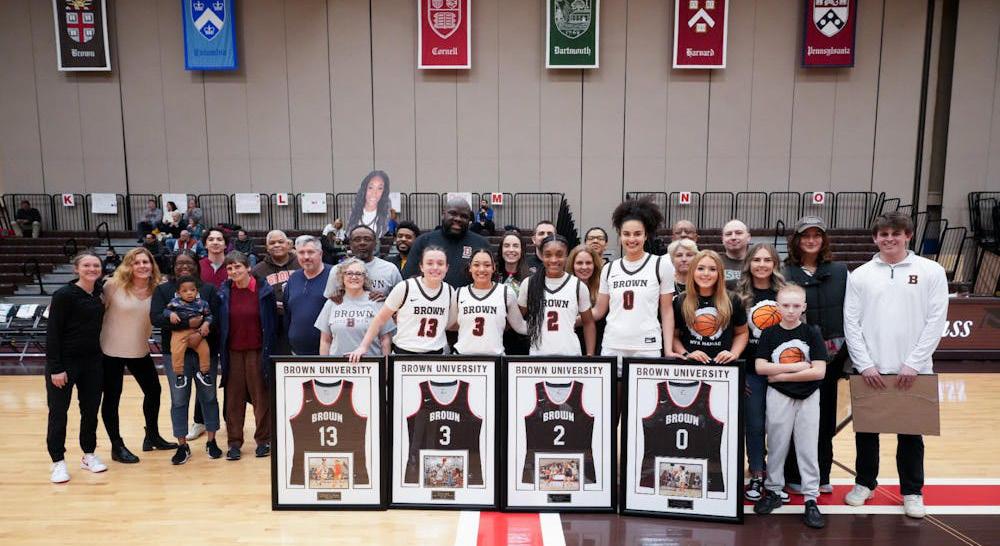
onds into the quarter, Kirk — whose voice rang the loudest earlier in the season when she was injured and encouraged her teammates from the bench — drained a triple, earning the first points of the game. Now, the bench came to encourage her, with their arms outstretched into the air and a series of threes formed by their fingers.
With 4:45 to go in the first quarter, Jones scored her first points of the contest after a nasty crossover left the defender chasing her shadow. This was the beginning of a 23-point, 11-rebound performance — a double-double to cap off Jones’s historic 1,097-point career.
“This team has literally been my family,” Jones reflected about her team-
mates. “The close bonds we have, the memories we shared — I’m eternally grateful for every single one of them.”
The first quarter ended right where it began: at the three-point line. When arnolie — who posted 20 points with four assists and two steals during the game — scored from distance with three minutes to go, she unleashed an avalanche of triples. Isabella Mauricio ’25 and Mady calhoun ’25 followed with nothing-but-net three-point shooting of their own, and the Bears claimed an 18-14 lead.
By the second quarter, Brown’s offense found its stride. Embodying the brawn of the Bears, the team attacked yale’s defenders, moving them off plat-
form for open shots, or displacing them beneath the rim for layups.
“a lot of people in our team were able to get downhill,” Jones explained. “and when ( yale) rotated over, we were able to hit open shooters.”
With two minutes to go, Mauricio — who ended the season with a 13-point performance this game alone — sent the crowd into a fury after drowning back-to-back triples. Propelled by their lethal sharp-shooting and a 6-triple first half, the Bears went into the locker room ahead 35-27. c oming out of halftime, Kirk brought the crowd to life, starting a call-and-response that filled the Pizz with a clamor of voices all shouting
“We up! We up!” The Bears, who claimed the lead in the first quarter, did not give it up for the remainder of the game, and the third ended with the Bears leading 51-44.
In the fourth quarter, an early offensive surge catapulted the Bears to a 60-46 lead. ada anamekwe ’26 crowned the 9-point run after intercepting a pass, leaving yale defenders to watch as she blazed down the court for a layup. a minute later, arnolie knocked down a three, and the crowd — already tasting the sweet tint of victory — burst into cheers. yale, reckoning with the possibility of a loss, took a timeout down 65-48.
With two minutes left in the game, the seniors took the court one final time. The crowd rose to their feet to watch the Bears close out their season with a 76-57 victory.
“It was really special — although we fell short of reaching (Ivy Madness) — that we won seven games in conference play,” LeBlanc told the herald. “Only two other teams have done that in the last 18 years here at Brown. Nobody’s done better than that. We want to be the next team to do better.”
“Obviously next year, the goal is going to be getting to the tournament,” arnolie declared. “I mean, we’re hosting it. I think it’s going to be super fun if we can get there and play in our own gym.”
This article originally appeared online at browndailyherald.com on March 10, 2024.

Dear Readers,
Didn’t see you there. Probably because today I went to the optometrist and got my first prescription. My 20/20 long years of boasting perfect vision have finally come to a close. This afternoon, I got to live out my long-time dream of trying on every pair of glasses in Warby Parker. For every pair I donned, I could imagine the new person I would become. I can see myself in a pair of chunky square tortoiseshell glasses, studying late at night in the Rock. Or maybe with the clear widerimmed glasses in a coffee shop downtown, sipping an overpriced matcha. The metal wire-framed glasses would transform me into the mysterious girl walking down Thayer, big headphones drowning out the noise. In the face of this upheaval, I am reminded that each day brings a new opportunity to become the person I’ve always wanted to be. With or without new glasses.
This week in post-, our writers, too, contemplate momentous life changes. In narrative, one writer muses on the triviality of life upon turning 20, while the other writes about crochet as a means of weaving together her past and present. Meanwhile in feature, our writer reflects on the growth and loss of her plants, a reflection of her transition to a summer move. In A&C this week, one writer contemplates the circular nature of life and grief, and the other speaks to building familiarity in her house, transforming it into a home. One lifestyle writer similarly muses on the meaning of home, struggling to define what it means amid new spaces. Another lifestyle writer this week reflects on taking number theory as a humanities major. Finally, our crossword will leave you feeling lucky for St. Patrick’s Day this weekend.
Next time you see me, I’ll be a new person. I’m not quite sure what new persona I will embody once I get my glasses; maybe the new frames will allow me to see the world in a new light, or allow me to focus on what’s really important (or maybe, just let me see the board during lecture). But one thing is certain: the first thing I’ll do once I get my glasses is pull out a copy of post-.
Lookin' sharp,


“What would you do if I was friends with a baby? Would you step in?”
“If I ask that on Google will that register me as a racist?”

1. Bb
2. Ur mom

3. Scout cookies
4. California
5. Barbie in a Barbie World
6. You ;)
7. Mean
8. Brown Eyed
9. Joan of Arc
10. Uptown


“The answers to all these seemed within our grasp. All it would take were a couple more candles, a healthy dose of belief, and another rainy, dark Wednesday night.”
— Damian Wasilewicz, “School Night Seance”


“In moments like these, I tend to have a hard time taking care of myself. I float around the edges of my body, slipping in and out of it with detached neutrality. It bumps into corners, lets go of dishes I’m trying to hold onto. It? Me? I’m not really sure.”
— Liza Kolbasov, “Stitched in Ink” 3.18.22


EDITOR-IN-CHIEF Joe Maffa
FEATURE
Managing Editor
Klara Davidson-Schmich
Section Editors
Addie Marin
Elaina Bayard
ARTS & CULTURE
Managing Editor
Elijah Puente
Section Editors Christine Tsu Emilie Guan
NARRATIVE
Managing Editor Katheryne Gonzalez
SOCIAL MEDIA
The alabama supreme court’s recent decision legally defining frozen embryos as children has already limited access within the state to reproductive care, such as in vitro fertilization. This decision is a striking reminder of the privileges we enjoy in a state like rhode Island and at a school like Brown, which offer us relatively unrestricted access to reproductive care, contraception and other forms of healthcare. This freedom of access is not guaranteed in all places and circumstances.
Last semester, Brown health services announced that it would offer free, over-the-counter emergency contraception to Brown undergraduate, graduate and medical students. The university’s dedication not only to providing emergency contraception and other resources for reproductive health, but also to making them free for all students, demonstrates that Brown values access to reproductive care. Even within a state like rhode Island with relatively generous reproductive healthcare access, ranking 12th nationally in 2022
To the Editor: as a staff member at Brown, I was pleased to see that the university has started to offer a new EsG fund for its employees’ retirement. I am grateful for the work of the Benefits Office and the university’s retirement Planning committee for this welcome step. I also applaud the activism of sunrise Brown to spur the creation of such an option.
I was especially interested in the news because I serve on the board of directors of Earth Quaker action Team, a Philadelphia-based environmental activist organization that targets corporations around climate justice. But I was disappointed to see that the fund that the university chose — the FTsE social Index Fund admiral — was managed by the investment manager Vanguard.
although the fund has positive features compared to other Vanguard funds — and over other retirement options at Brown — it receives a mixed rating from Fossil Free Funds, a website that evaluates the climate impacts of various investment funds. The Vanguard fund received a “d” rating on fossil finance and a “c” rafting for its fossil fuel insurance policies. The problems, however, go deeper.
Vanguard is the world’s largest investor in fossil fuels. additionally, a 2023 report by Majority action found that, by a range of measures, Vanguard holds consistently bottom-tier records on shareholder voting on resolutions surrounding issues like racial equity, organized labor and political spending disclosures. For these reasons, the global Vanguard sOs campaign has been pushing Vanguard to change course.
I am proud that EQaT is currently part of that global campaign. In addition to escalating with direct action, EQaT is calling on supporters everywhere to pledge “Never Vanguard.” unfortunately, Vanguard has recently chosen to move in the wrong direction: for example, by bowing to right-wing pressure and pulling out of the Net Zero asset Managers initiative — which was already weak and unenforceable.
as much as I would like to take advantage of an EsG option for my retirement, I cannot get behind the Vanguard fund. I hope that the retirement Planning committee will continue their work to give faculty and staff sustainable retirement plans, and offer a different choice than Vanguard.
Ben safran Institute Manager, cogut Institute for the humanities
This article originally appeared online at browndailyherald.com on March 10, 2024
for reproductive rights, we commend this purposeful commitment. direct access through student health services also allows students to bypass the complex us healthcare and insurance system, including copays and other prohibitive fees.
Many students at Brown are from states or other countries where reproductive and contraceptive care aren’t guaranteed. Only at Brown can they find affordable, accessible and even legal forms of this type of necessary care. Brown students, especially those from places with protections for health care, shouldn’t take this access for granted or see it as inevitable.
The alabama legislature has responded relatively quickly by passing legislation meant to specifically protect IVF clinics from civil or criminal liability. This legislation, however, could already be vulnerable to challenges to its constitutionality and scope. More importantly, this challenge to IVF is only the latest development in a continued trend of legal decisions threatening nationwide ac-
cess to all types of reproductive-related care. This chain includes case dobbs v. Jackson Women’s health Organization and the forthcoming alliance for hippocratic Medicine v. Fda case, which could limit access to one of the most common drugs used for non-surgical abortion. The type of emergency contraception offered for free by Brown isn’t immune to the repercussions of federal ruling. The same anti-abortion lobbying groups and organizations that have prompted these cases to reach the supreme court also oppose emergency contraception like Plan B — it’s just further down in the line of fire.
as Brown students, when we read about supreme court decisions in alabama or upcoming deliberations at the highest us court, we shouldn’t dismiss them as irrelevant to us, even if we are currently protected from their effects. ultimately, the university has to abide by evolving state and federal law regarding contraception and reproductive care. and Brown students also have to con-
sider carefully the regulations in their home states or the states where they relocate after college. We cannot simply enjoy our sense of security within the Brown bubble. We must support students who lack access to necessary healthcare for geographic or economic reasons and continue to actively engage in the national political landscape, advocating for equity of access for all.
Editorials are written by The Herald’s editorial page board and aim to contribute informed opinions to campus debates while remaining mindful of the group’s past stances. The editorial page board and its views are separate from The Herald’s newsroom and the 134th Editorial Board, which leads the paper. This editorial was written by the editorial page board’s members Paul Hudes '27, Paulie Malherbe '26, Laura Romig '25, Alissa Simon '25 and Yael Wellisch '26.
When I toured colleges in 2020, I couldn’t help but notice the signs around campus proudly declaring pledges to achieve “net-zero carbon emissions” by 2040 or 2050. While it was encouraging to witness such commitments, especially coming from r io de Janeiro, Brazil, where such pledges were not yet being made, the timelines struck me as alarmingly distant. I imagined my future self living in a completely different world in 2040, and I found it hard to understand how any goal for that far out into the future could have implications for the high school junior that I was. More importantly, would these deadlines even be enough?
s cientific consensus unequivocally emphasizes the urgency of addressing anthropogenic greenhouse gas emissions to mitigate the catastrophic impacts of climate change.
To avert an intense crisis, limiting global warming to 1.5° c is imperative. To do so, achieving global net zero carbon emissions by 2040 is critical. It is within this context that Brown, through its s ustainability s trategic Plan, pledged to achieve net-zero G h G emissions by 2040. The endeavor is estimated to cost around $200 million dollars and requires transitioning to 100% renewable electricity as well as converting Brown’s central heating system to low temperature hot water heated by renewable electricity. s etting such a goal, especially with remarkably detailed interim targets is commendable, but if the planetary deadline is 2040, should Brown — a billion-dollar institution in the world’s second highest G h G-emitting country — consider an earlier timeline?? s houldn’t we push for faster changes and help set a precedent for industries that are less likely to phase out on time?
The concept of “net-zero” entails achieving a balance between greenhouse gas emissions released into the atmosphere and those removed from it through various means, such as offsets or carbon capture and sequestration. While Brown ambitiously seeks to sig -
nificantly reduce its emissions, the u niversity still predicts a reliance on offsets to reach net-zero.
Brown’s s ustainability s trategic Plan, acknowledges that the trajectory of life on Earth in this century hinges on “a dramatic shift in the way people go about their daily lives and the way organizations do business.” The Office of s ustainability and r esilience is doing incredible work behind the scenes to work towards net-zero, like supporting the construction of a solar farm expected to offset 70% of annual electricity emissions, and the drilling
“
es members of the university to rethink habits that are contrary to a more energy efficient future — could be a fun and valuable addition to our campus. In 2022, cornell’s competition contributed to $160,000 in electricity savings and identified 14 energy reduction projects in campus buildings.
a 2021 report by s&P Global underscores the widespread inertia among companies when setting emission reduction targets, let alone committing to net-zero, as well as the lack of interim goals for those that did make commitments.
If the planetary deadline is 2040, should Brown — a billion-dollar institution in the world’s second highest GHGemitting country — consider an earlier timeline?
of three, 1,000 feet deep test wells which will help design a plan for geothermal energy at Brown.
But, these acknowledgements and plans still fail to incentivize holistic change. Many of us still act in ways that are contrary to energy conservation, such as taking the elevator down a few flights of stairs and keeping windows open during the winter to help alleviate excess heat. s imple initiatives like c ornell’s energy saving Energy s mackdown competition — which engag -
Given the urgency of the climate crisis, there is already very little room for trial and error. If we wait until 2039 to “finish up” on getting to zero, the lack of a margin of error will be even more tragic, especially if there are too few institutions already at net-zero to set a precedent.
a s a nonprofit institution with a $6.6 billion endowment and esteemed alumni and faculty, Brown is uniquely positioned to lead by example. Why then, should we not aspire to accelerate our timeline to 2030?
s ince plans are already in place to achieve a 75% reduction in G h G emissions by 2025, offsetting the remaining 25% appears not only feasible but necessary. While the university is spending $200 million on its net-zero goal, Brown also expects to save over “$80 million through 2040” as a result of power purchasing agreements (our solar farms will allow us to earn credits on our utility bills, per state law). a lso, as referenced in the name of the Office of s ustainability and resilience itself, these spendings are a part of making Brown more resilient to climate disasters. Given that, and the social benefits that could be achieved by an earlier net-zero deadline, the extra costs that the university might incur from pushing up the deadline are less significant.
While it is key to pressure corporations to make more ambitious climate targets as consumers and as voters, the reality of their profit-driven agendas makes it unlikely that they will be leading the charge. It is also not realistic to expect that other higher education institutions in the u s . with much smaller endowments or such organizations in developing countries will have the ability to spend as much as Brown can in getting to net-zero. By expediting our journey to net-zero, Brown can serve as a model to other organizations.
a s we adhere to international climate change recommendations, aiming for 2040 falls short of the urgency demanded by the crisis at hand. If we are to uphold our commitment to combating climate change, we must lead by example and invite others to join us on this expedited path to a carbon-neutral future.
Maria Claudia Gurjão ’26 can be reached at maria_claudia_gurjao_bonaparte@ brown.edu. Please send responses to this column to letters@browndailyherald.com and other op-eds to opinions@browndailyherald.com.
Students express mixed views on test score requirement, legacy
BY TALIA LEVINE SENIOR STAFF WRITERLast week, the university announced that it will once again require students to submit test scores in the upcoming admission cycle. Based on recommendations by the ad hoc committee on admissions Policies, the university will continue to offer early decision and seek community input on legacy admissions.
The herald spoke with community members and admissions experts about their reactions to these decisions.
Nick Lee ’26, co-president of students for Educational Equity, was “livid” when he heard that Brown would be reinstating the test score requirement. “It felt like the decision that was made was directly the opposite of everything we’ve been calling for,” Lee said.
But he said he was ultimately unsurprised by the decision, considering that dartmouth, yale and MIT had all announced they would do so prior to Brown’s decision.
alex shieh ’27 said he believes that “reinstating Brown’s testing requirement is a win for all applicants, as it allows admissions officers to better understand their academic skills.” shieh added that, in his view, test scores will allow admissions officers to have a more standardized view of applicants, noting that GPas can be unrepresentative because grading practices can vary by school.
“reinstating saT scores strengthens this meritocracy by ensuring that students are assessed on what they can bring to a school, rather than by subjective factors (with) greater susceptibility to racial bias or class bias, like recommendation letters or extracurriculars,” shieh added.
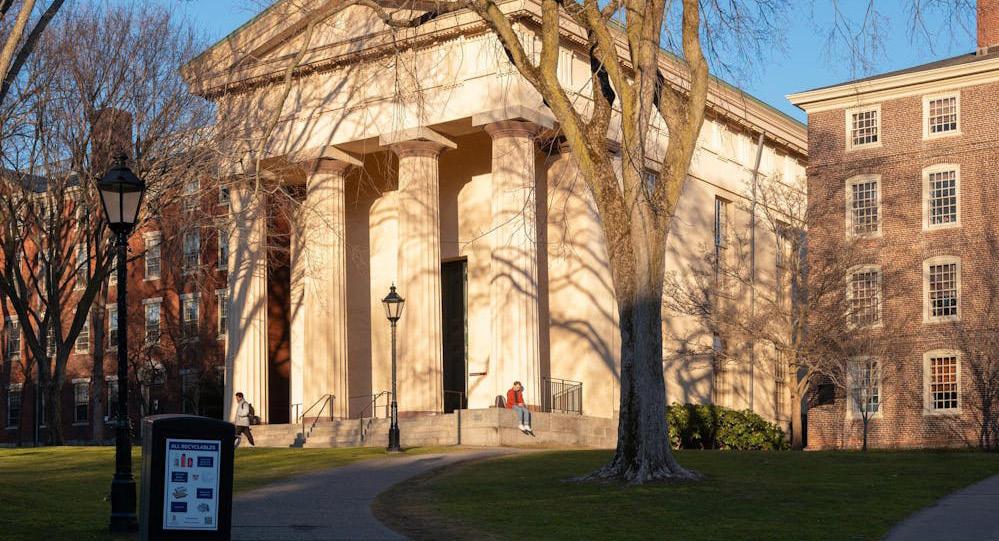
a study released October 2023 by Opportunity Insights found that “nonacademic ratings” used to evaluate applicants varied greatly by socioeconomic status, attributing the discrepancy to expanded access to extracurriculars and guidance counselors among affluent students.
sara harberson, founder of application Nation and former associate dean of admissions at the university of Pennsylvania, said that the reinstatement of the testing requirement will not change how she advises students.
“despite most colleges adopting a test-optional policy during the pandemic, it has been abundantly clear that especially among the Ivies and other elite colleges, students submitting scores are significantly more likely to be admitted than those who do not report scores,” harberson wrote in an email to The herald.
a survey of incoming first-year students conducted by The herald found that 76% of the class of 2027 submitted a test score. since the beginning of the test-optional policy, approximately 60% of applicants submitted a score, according to the executive summary of the committee’s recommendations.
as a result of the committee’s recommendations, the university also announced that it would be continuing to offer a binding early decision policy instead of adopting the non-binding early action policy practiced by peer institutions including harvard, Princeton and yale.
“The committee considered whether a non-binding Early action program would be preferable for any reason and concluded that there was some risk that this could place Brown at a slight disadvantage in enrolling very highly qualified students who are subsequently admitted to other institutions through regular decision,” the executive summary reads.
according to the summary, a common criticism of the early application option is that students are unable to compare financial aid offers from other universities. President christina Paxson P’19 P’Md’20 wrote to the Brown community that the “committee’s conclusion (is) that this broader concern does not apply to Brown.” Paxson wrote that students have the option of comparing financial aid estimates before they apply. “Our financial aid offers are very generous, and online calculators give students and families good estimates of their
cost of attendance at Brown,” she wrote. “The fact that 60% of Ed applicants express an intent to apply for financial aid indicates that applicants are confident that, if admitted, they will receive the financial support they need.”
But for harberson, “To rest on Brown’s dedication to meeting a student’s demonstrated need ignores the fact that lower- and middle-income students cannot comparwwe financial aid and merit scholarships from other colleges when they commit to early decision,” she wrote.
“The issue with early decision, and an issue that I think has been repeated time and time again, is that students are able to apply for early decision if they are assured they will get the aid they need,” Lee said. These students, he said, are those who know their parents will be able to afford tuition and students who are positive the university will meet their total demonstrated financial need.
richard Kahlenberg, who served as an expert witness in students for Fair admission vs. harvard and university of North carolina, wrote that “in the face of a supreme court decision eliminating the use of racial preferences, a place like Brown should be doing everything it can to find new paths to diversity.”
“This decision to retain early decision and legacy preferences raises big questions about Brown’s commitment to diversity in a new legal environment,” Kahlenberg added.
according to The herald’s first-year poll, enrolled students who applied early were more likely to have attended a private high school, have parents who attended college, have legacy status and/or not have financial need.
Paxson has announced that the university will continue to seek input from community members concerning legacy admissions. Brown’s legacy policy provides preference to applicants who have one or more parents who completed an undergraduate degree at Brown.
shieh, a legacy student himself, does not support Brown’s practice of legacy admissions.
“Brown should seek to build a community based on students’ passion, intellect and potential, not what they look like or who their parents are,” shieh wrote in an email to The herald. “Pure merit-based admissions also allows all students, including legacies like me, to have the feeling of certainty that they earned their spot.”
For Kahlenberg, “Legacy preferences constitute affirmative action for the rich. This practice was never defensible, but even less so now that Brown cannot use race in admissions,” he said. “Lots of other superb universities — Oxford, cambridge, Johns hopkins, Berkeley — don’t use legacy preferences. Brown should join them.”
robert Guterl ’26, a sEE admissions and access team member, said that Brown’s lagging socioeconomic diversity and the disproportionate number of wealthy students cannot be separated from the school’s use of legacy admissions.
“When I think about legacy … I think of the phrase ‘wealth builds wealth,’” Guterl said. “Once you get to a place like Brown, you graduate (and become) very successful and create wealth for yourself and for your family.”
In a recent interview with The herald, Paxson explained legacy students “become increasingly” diverse over the years. she said that if the university “were concerned primarily with socioeconomic diversity, it would make sense to eliminate” legacy admissions.
Lee referenced this quote, saying, “that to me is the most direct quote and the most evident example that we should get rid of legacy admissions because we should care about socioeconomic diversity.”
This article originally appeared online at browndailyherald.com on March 10, 2024.
Initial plans of strike changed hours before rally
BY DANA RICHIE SENIOR STAFF SENIORroughly three dozen tour guides and 150 student supporters picketed on Waterman street Friday afternoon in support of Janek schaller ’24, a tour coordinator demoted from his role after making comments on a staff slack channel.
schaller was demoted from his position and prohibited from giving active tours last month after sending a slack message in the channel #fun-tour-guides on Feb. 2, the first day of a week-long hunger strike in support of a divestment resolution.
In the message, schaller explained plans from divestment demonstrators to disrupt tours and said he “cooperated with other organizers” to allow for “tour disruptions to happen in a safe and controlled manner.” schaller verbally resigned four days later.
Logan Powell, Brown’s associate provost for enrollment and dean of undergraduate admission, said he cannot comment on “individual, confidential employment matters.”
“We are supportive of all of our tour guides and want to provide them with the time, space and safety they need in their roles as campus ambassadors,” he wrote. “We are committed to a positive and productive partnership with the tour guides
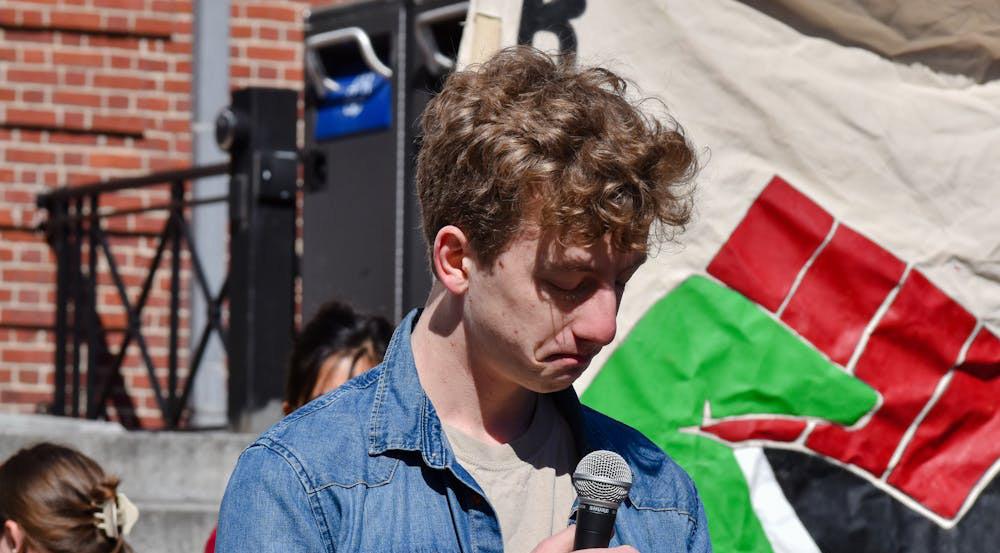
within the framework of university values and policies.”
Organizers announced the Friday demonstration at the end of a rally for International Working Women’s day that was hosted by the Graduate Labor Organization’s Palestine solidarity caucus on the Main Green at noon.
up until less than an hour before the rally, demonstrators had intended to initiate a strike in support of an unfair labor practice complaint that schaller submitted to a federal mediator last week. according to a March 7 press release by organizers, “a majority of Brown university student tour guides” — 37 of the 71 actively on payroll — were originally planning to participate in the strike, which would have involved a picket on Waterman st from 9 a.m. to 5 p.m. daily during the work week.
Organizers spent weeks gauging support among tour guides before reaching a
“critical mass” of 37 tour guides committing to strike on Feb. 27.
But organizers decided to postpone the strike, instead waiting for a town hall hosted by the admissions Office on Thursday March 7, according to caroline sassan ’24, one of the organizing tour guides.
after the town hall, which Powell described at “honest and thoughtful,” the organizers reached out to the individuals who had previously committed to a strike, but were unable to confirm that they still had majority support, according to tour guide John Bellaire ‘25.
“The floor was open to discuss any topic, and we expressed our commitment to listen, build community, and chart a clear path forward,” Powell wrote in an email to The herald describing the town hall. “Tour guides are faced with a number of difficult questions and we spent considerable time discussing how to be honest, authentic
and positive. as campus ambassadors, we place a great deal of trust in the tour guides and they do a wonderful job representing Brown.”
The demonstrating tour guides called on the Office of college admissions, the department that oversees campus tours, to reinstate schaller to his former role. They also alleged that dismissing him for his comments on slack constitutes an unfair labor practice.
In a Feb. 8 email shared by organizers and reviewed by The herald, Powell wrote to schaller that his slack message “caused considerable distress” and that the admissions Office “made the decision to shift your tour coordinator duties to other staff in college admission.” In his email to schaller, Powell also acknowledged that schaller had verbally resigned on Feb. 6.
In a March 4 letter addressed to Powell and the admissions Office, demonstrators also demanded that the admissions Office commit to a meeting by March 22 in order to conduct “collective negotiations on codified policy regarding free speech protections.”
The demand follows an email from the admissions Office sent Feb. 23 to tour guides outlining guidelines for conduct during tours.
In the email, which was reviewed by The herald, a representative from the admissions Office wrote that “sharing your individualized negative experiences is not part of the mission or purpose of the tours.”
The letter also called on the admissions
Office to revoke this statement.
d emonstrators also called on the university to bring to the corporation a 2020 accrIP report which recommended Brown divest from companies that facilitate the Israeli occupation of Palestinian territory,” or a revised “critical edition” created by the campus group Brown divest coalition.
President c hristina Paxson P’19 P’Md’20 previously declined to present the report directly to the Brown corporation, instead directing protestors to the advisory committee on university resource Management, which considers divestment proposals. Paxson pledged to “fast track” the Brown divest coalition’s proposal in an interview with The herald last month.
For sassan, participating in the demonstration is part of her role as a campus ambassador. “If you want us to keep talking about this school, we won’t do that in a very one-sided way,” she said. “you’re going to have to listen to what we have to say, too.” during the demonstration, schaller said he’ll “never give another” tour. For him, tour guides should share “unvarnished truth for the benefit of prospective students.”
The rally was supported by the Graduate Labor Organization, Teaching assistants Labor Organization, Palestine solidarity caucus, Third World Labor Organization and Brown divest coalition.
This article originally appeared online at browndailyherald.com on March 8, 2024.
Grande’s seventh studio album explores pain, heartbreak, beginnings
BY CAMPBELL LOI SENIOR STAFF WRITERariana Grande is no stranger to the spotlight. From her early roots in musical theater — performing on Broadway at just 14 years old — and on Nickelodeon, Grande’s angelic vocals and impressive four-octave range have rocketed her to stardom since her first album “yours Truly” was released in 2013. With an incredibly accomplished career spanning more than a decade, she is one of the most popular musicians in the industry, currently ranking 5th in the world for monthly listeners on spotify.
More recently, the singer’s media presence has been quite chaotic. she underwent a divorce from d alton Gomez after just over two years of marriage and subsequently entered a controversial relationship with her “Wicked” co-star Ethan slater. critics were quick to bash Grande online, making fun of her new relationship and shaming her for being a “homewrecker” to slater’s family. When it was announced in January that Grande was releasing new music, fans were eager to know how the project would address this situation.
Grande released the highly anticipated “eternal sunshine” on March 8 — her seventh studio project and first long-form release since “Positions” in October 2020. In an epic response to those critiquing her every move, Grande speaks her unapologetic truth on the album, taking listeners through her heartbreak and subsequent budding relationship with 13 new songs.
The title is a reference to the 2004 film “Eternal sunshine of the spotless Mind,” starring Jim carrey and Kate Winslet, in which a couple undergoes a medical procedure to have each other erased from their memories following a
REVIEW

cOur
OF rEPuBLIc rEcOrds
that her fans know and love.
painful breakup. For Grande, a longtime fan of carrey and the film, there were many layers to using this concept for her album. Though it is not officially affiliated with “Eternal sunshine of the spotless Mind,” the album contains several references to the film both in its lyrical content and music videos.
adVErTIsEMENT
In line with the film, themes of pain, heartbreak and new beginnings define the album, taking listeners through stages of a breakup. Opening with a slow ballad on “intro (end of the world),” Grande ponders whether or not to stay in her current relationship, weighing the pros and cons of speaking her truth and wondering what she really wants.
she then enters into the next track,
“bye,” with newfound strength and courage, repeatedly exclaiming “boy, bye” and “it’s over” throughout the song’s chorus.
Though “bye” is much more upbeat and self-assured than the previous song, Grande emphasizes that this confidence did not come easily. In the song’s opening line, she references how past heartbreaks have prepared her to take on this new challenge, singing “this ain’t the first time I’ve been hostage to these tears.” The bridge similarly captures such mixed feelings, with Grande calling the situation “bittersweet” and commenting on how challenging it was for her to sing about.
This tug-of-war between positive and negative feelings is consistent throughout the album, highlighting the
complex blend of emotions commonly associated with a breakup. Immediately following the strong and independent “bye” comes “don’t wanna break up again,” which sees Grande again grappling with the dilemma of protecting either her marriage or her mental health. Later songs like “we can’t be friends (wait for your love)” and “i wish i hated you” similarly explore the aftermath of the separation, showing Grande at her most vulnerable.
sonically, “eternal sunshine” explores new territories while staying true to Grande’s roots. Though the album’s first single “yes, and?” had seemingly marked the beginning of a new sound for Grande — with light disco and house influences — the majority of the project sticks to the classic pop and r&B sound
Tracks like “true story” and “supernatural” particularly showcase Grande’s multifaceted talents as an artist — flaunting expertly crafted production, strong and catchy melodies and the tight, multilayered vocal harmonies she is known for.
Though some fans immediately took to social media to attack her ex-husband after the album was released, Grande maintains that such openness about her relationship and pain should not be a cause for any further harm or negativity.
“although this album captures a lot of painful moments, it also is woven together with a through line of deep, sincere love,” she wrote in a post on her Instagram story. “If you cannot hear that, please listen more closely.”
Faye Webster meditates on the mundane in new album ‘Underdressed at the Symphony’BY JOHN SEXTON STAFF WRITER
“underdressed at the symphony,” Faye Webster’s fifth studio album, begins quietly. a sleepy, soft drum beat and mellow guitar rise to a crescendo, and bright piano notes flood forth like a new day. appropriately, the six-minute opener, “Thinking about you,” feels like a morning anthem, as Webster gently sings the titular words again and again over sunny guitars, drums and bells. “I’m thinking about, thinking about you,” she repeats, until the words seem to lose their meaning.
On her new album, the singer-songwriter from atlanta acquiesces to the everyday. she sings of lazy and mundane scenes at home, and fittingly, the music is the perfect soundtrack for life’s monotonous

morning moments — dusting shelves and spritzing houseplants. yet the detailed and meticulous quality of most of the recordings ensures that the record doesn’t slip into the bleak category of tunes known as “pleasant background music,” a description that would do the music a great disservice.
“Wanna Quit all the Time” follows a
pessimistic and anxious Webster as she mulls over the mundane. she thinks about quitting her job and loathes the color of her house. “I think I’ll figure it out,” she sings behind a beautiful and lush steel guitar that guides the song. Bells and keys adorn the production like ornaments, making the song engaging and saving it from be-
ing mundane itself. In this way, the album at times feels paradoxical: Lazy everyday moments and anxieties are transformed into intricate compositions.
The record’s warm, soft and largely cohesive sonic palette does, however, have a few interesting production choices sprinkled throughout to ensure that its music doesn’t grow stale. In “Feeling Good Today,” for example, a vocoder effect gives Webster’s voice a curious auto-tune sound that doesn’t overstay its welcome and further complicates the record’s paradoxical relationship with the quotidian.
The record suffers when the music itself becomes monotonous. On “eBay Purchase history,” the boredom that Webster sings about infects the song itself. In the chorus-less song, she nonchalantly repeats the same vapid melody behind casual guitar playing. But Webster seems self-aware of this dullness. “It’s kinda nice to have familiarity,” she admits. This lower moment is followed by the titular track, “underdressed at the
symphony” — one of the highlights on the record, where all of its best attributes come together. a lush steel guitar, washedout drums and a slyly optimistic piano accompany a wistful Webster. Moreover, the song contains the album’s ultimate moment of bathos. “I’m underdressed at the symphony,” Webster sings. afterward, there’s an expensive, grandiose orchestral flurry of strings that juxtaposes the image of a too-casually dressed Webster.
The album title was inspired by Webster’s own experience of feeling underdressed at the atlanta symphony Orchestra. her fifth studio album seems to embody this memory. although the music is meticulous, beautiful and sometimes even exquisite, Webster insists that she feels inadequate for such opulence. she’s a homebody at heart. “I get lost in a song / Take a walk, call my mom / don’t go out anymore / In half an hour, I’ll be bored,” she sings on the album’s final song, “Tttttime.”
This article originally appeared online at browndailyherald.com on March 10, 2024.
REVIEW
Acclaimed artist’s collection of text, image is “a different kind of novel”
BY LILIANA GREYF SENIOR STAFF WRITERanne carson’s 23rd publication, “Wrong Norma” meditates, deconstructs, scolds, announces, humors and — most importantly — questions a seemingly disparate cluster of topics. In an unruly, genre-less, collaged collection of text and images water, blood, Flaubert, form, crows, Guantanamo, grief and the rig Veda gather in a crowd of luminous nouns. Published in February, the work is a fabulous testament to carson’s persistently radical unboundedness.
In “Flaubert again,” the sixth of 25 titled pieces, an aimless author is haunted by the “fantasy of a different kind of novel” — a fantasy, she laments, that “all novelists share.”
“‘What would such a form entail?’” this carson-disguised-as-protagonist asks herself and her readers. her tentative, skeptical answers are abolition (not renouncement) and continuity — “a story of nothing and everything at the same time.” The writer and her character realize they are summarizing Flaubert (again) and seem quickly to forget about this objectless desire.
here, carson taps readers on the shoulders and whispers a little joke, quiet enough that the punchline isn’t entirely intelligible. On the back cover
REVIEW
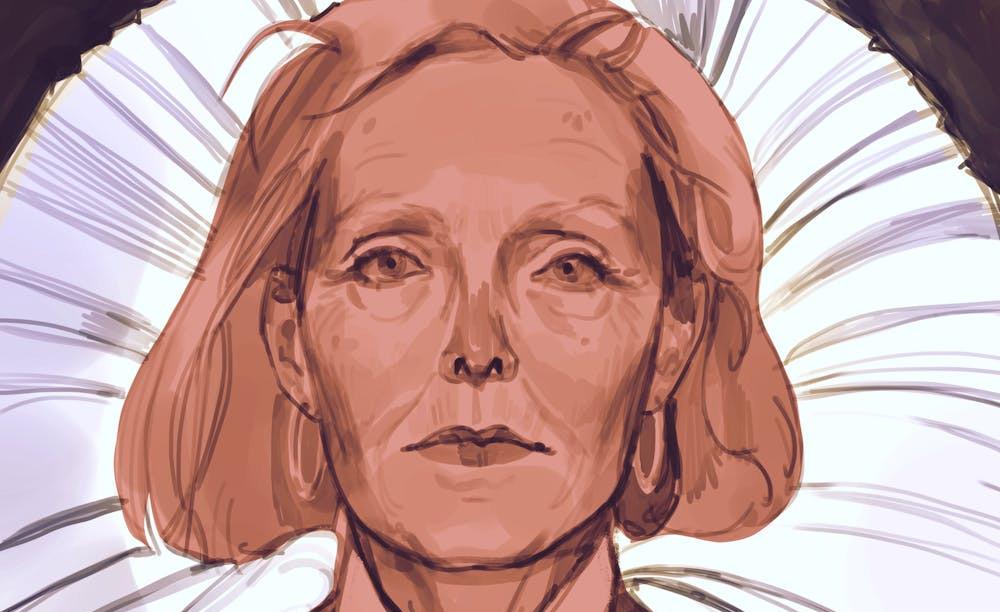
of “Wrong Norma,” carson continues her witty exposition in a text that successfully satisfies the impossible literary inclination to redefine the novel: “The pieces are not linked. That’s why I’ve called them wrong.”
c arson causes us to question: is connectedness correctness? are we (in) correct about (in)correctness? “Wrong night, wrong city, wrong movie, wrong ambulances … wrong Norma desmond,” carson opens the titular prose-poem that closes the collection. Perhaps she is (knowingly, could it be?) wrong about the wrongness of her piece, even if her implied definition stands. d espite its author’s claim, “Wrong Norma” is not only thematically coherent but masterful.
The “new novel” is itself a redundancy, a phrase of synonyms, a repetition. Invoking the charge of repetition with difference (and repetition as difference), the text picks up and puts down words in
a marvelous, incoherent and delightfully recurrent rhythm.
The cover of the book features a distorted image of a fox — which will find itself reappearing in various moments of the text — in a twisted, warped visual display. In “1=1,” the first piece in the work, the fox appears as a chalk drawing. Over one hundred pages later, in “The Visitors,” it reemerges along with a gathering of unannounced passersby, “trembly” and “breath(ing) with the night” in the home of a quirky, thesaurus-loving narrator.
This narrator-embodying-carson waxes her synonyms, taken right out of roget’s thesaurus: “Incongruous (inappropriate, inapt, improper, incompatible, irreconcilable, inconsistent, unusual, warring, strange, alien),” referring simultaneously to the disunion (through meaning) and repetition (through form) of the book within which her piece sits.
Whether the purpose of the academy awards is to be a vibrant celebration of cinema or pure entertainment rooted in hollywood glamor, sunday’s ceremony fell flat in both respects.
It wasn’t that the telecast was necessarily bad, but it was incredibly boring — which is arguably worse.
“Oppenheimer” took home Best Picture as well as six other accolades including Best actor (cillian Murphy), Best supporting actor (robert downey Jr.), Best director (christopher Nolan) and Best cinematography (hoyte van hoytema).
Trailing in second, “Poor Things” won four awards.
While last year’s ceremony was not particularly entertaining either, at least it showcased monumental historic triumphs.
“Everything Everywhere all at Once” broke barriers, ushering in refreshing change to the typical lack of diversity that marks the academy’s history. The generally predictable results this year added to the mundanity of the viewing experience.
Emma stone’s Best actress win for “Poor Things” and da’Vine Joy randolph’s Best supporting actress win for “The holdovers” allowed for two heartfelt speeches that highlighted what the Oscars should really be about: a love for movies and the process of creating them. yet, stone’s
The fox slinks away, only to reappear several essays later.
“did I mention my admiration for Éric rohmer, yes I think so,” carson and this narrator write together. This is the sixteenth time rohmer’s name is used in under 30 pages — it appears 14 pages earlier, and 15 pages before that, as well as smattered uncountably between the collection’s named pieces. here, again, the use of motif reappears, hidden playfully in plain sight under a blanket of so-called wrongness. In carson’s plotless poems (which appear between most of the collection’s named pieces and look to be pasted and collaged onto the page), she asks again and again: “do you like the films of Eric rohmer;” “do you like jam;” “what is your philosophy of time;” “how do you sustain morale during a long project.” she always answers herself differently — “dress dandy,” “this cradle of forehead,” “sorry,” “yes during the night.”
“some questions don’t warrant a question mark,” carson writes, in a defensive (and humorous) response. she might be making a linguistic conjecture, or else deconstructing the binary between inquiry and answer. as a translator, poet, performer and visual artist enjoying her fourth decade of acclaim, carson is qualified for most anything.
she is perhaps instead implying that her asking is an end in-and-of itself, a causation of boundless ideation rather than definitive retorts. There is no right answer, she seems to say, only Wrong Normas. “What can you control?” she asks in “What to say of the Entirety.”
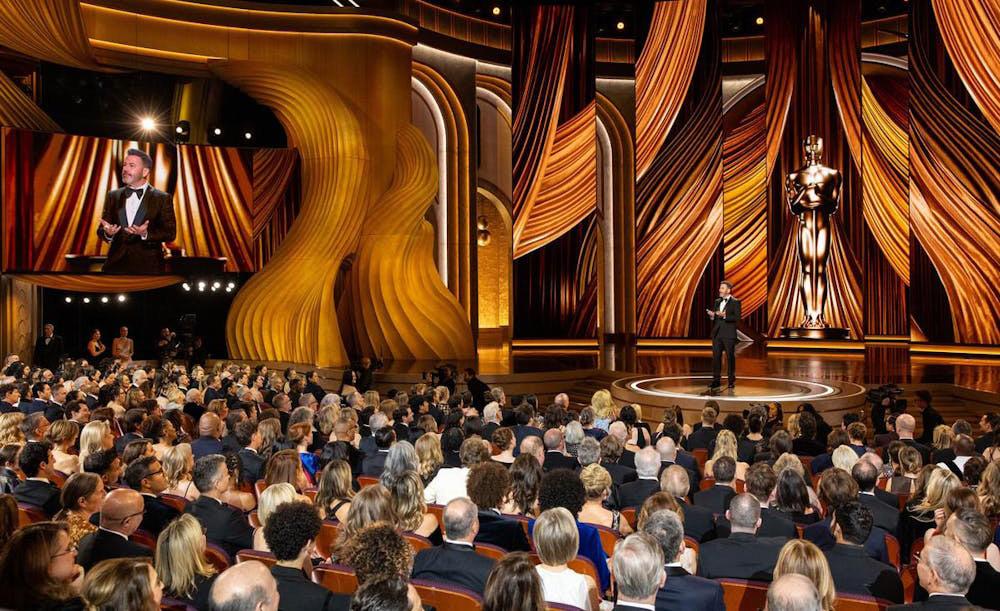
sweet remarks were coupled with Lily Gladstone’s upset loss. This is not to say stone’s inventive, beautifully and wholly unique performance was undeserving — she earned the award. But Gladstone was predicted to be the first Native american woman to win an acting Oscar, a point hard to forget considering her own impactful and emotional performance in “Killers of the Flower Moon.”
This past summer was marked by the “Barbenheimer” frenzy, a phenomenon that brought many viewers flocking back to the theater and reignited the fading mov-
iegoing experience. There was hope that such fervent energy would fuel this year’s awards ceremony, but the excitement of “Barbenheimer” was nowhere to be found in this year’s show.
“Barbie” walked away with only one award: Best Original song for “What Was I Made For?” by Billie Eilish and FINNEas, performed live at this year’s ceremony. It’s true, though, that “Barbie” should be credited for some of “Oppenheimer”’s success in the box office due to the two films’ concurrent release.
This cooperative coexistence was not
“Wrong question. can you treat everything as an emergency without losing the reality of time, which continues to drip, laughtear by laughtear (sic)? Where to start?”
There is no “start,” of course — to encapsulate this theory of possibility is carson’s temporal deconstruction, ever-present across her oeuvre. In a raucous postmodern translation of alkibiades’s speech from Plato’s symposium, the homoeroticized socrates muses on Bob dylan. a man who looks like Joseph conrad walks out of an elevator, so the narrator dresses up like Joseph conrad and walks out of the same elevator, hoping to find himself standing on the other side of the doors. In arguably the most memorable piece in the collection, “Lecture on the history of skywriting,” the narrator — the sky itself — writes about its own desire to be written on. “For a creature who exists (like myself) outside time, death has no instant,” the sky describes. “I have no instant. I am at all times.”
Where to end? The supposed disjunction — the wrongness of this work — is permeated by carson’s repetition of subject matter and theme, creating a linkage that creates a refrain, binding the whole work inextricably to itself. Like the water she writes of on the first page of this brilliant book, carson’s “wrong” text “has a right place to be but this place is in motion, you have to keep finding it, keep having it find you. your movement sinks into and out of it with each stroke. you can fail it with each stroke. What does that mean, fail it?”
reflected in the wins of the night nor the nominations — a fact that host Jimmy Kimmel pointed out at the beginning of the ceremony by acknowledging Greta Gerwig’s snub for Best director and Margot robbie’s snub for Best actress. To some extent, the intense recognition of “Oppenheimer”’s commercial and critical success in comparison to the lack thereof for “Barbie” is precisely what “Barbie” set out to address.
The addition of personal praise given to each of the acting nominees by previous winners was deeply deserved and
appreciated, considering each nominee’s contributions to cinema. and Jonathan Glazer’s call for a ceasefire in Gaza provided a moment of reflection as he accepted the Best International Feature Film award for “The Zone of Interest,” adding to the multitude of past winners who have used their speeches as opportunities to make a wider political appeal.
a few additional wins stood out. a funny, enjoyable and pop-culturally relevant “I’m Just Ken” performance, a hilarious Kate McKinnon and steven spielberg exchange and a naked John cena presenting the award for Best costume design brought much-needed comedic relief to the ceremony.
But by the end of the show, audiences were left feeling neither empowered nor satisfied.
Without any particular excitement, appreciation or even drama, the relevancy of the Oscars still stands in question in a climate where the allure of the silver screen is waning and audiences crave authenticity alongside spectacle. The awards feel increasingly superficial and formulaic, with more effort directed toward avoiding criticism than to drawing attention and appreciation.
The academy awards’ influence and relevance relies on audiences’ interest to tune in. Now, having completed two shows without any noteworthy surprises, only time will tell if the awards can preserve cultural pertinence.
This article originally appeared online at browndailyherald.com on March 11, 2024.
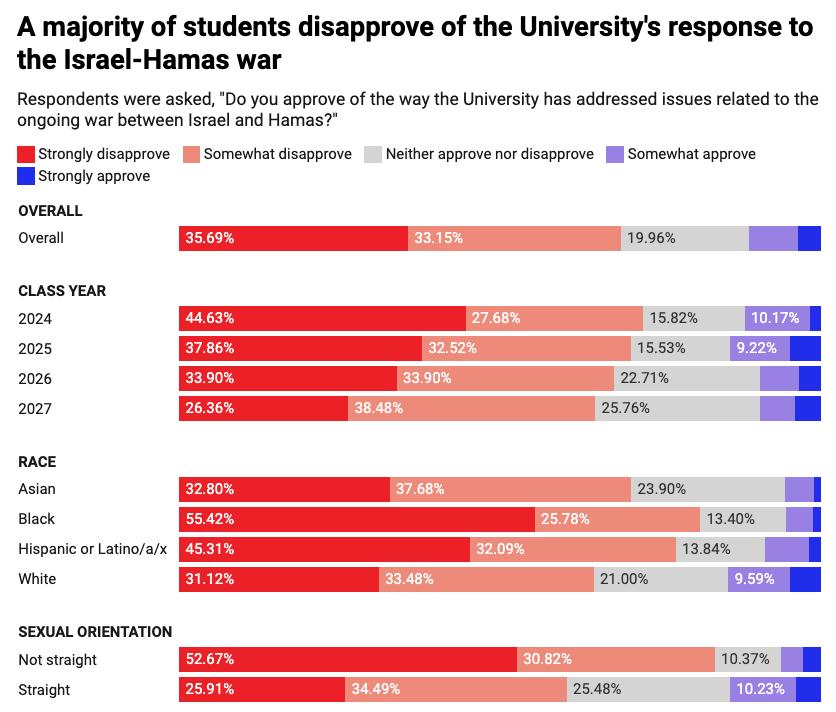
OWEN dahLKaMP aNd KELVIN JIaNG / crEaTEd WITh daTaWraPPEr
With smaller sample sizes, the likelihood of misrepresenting certain groups in a cross tabulation increases. The Herald’s goal is to minimize the risk of representing any group inaccurately, so we omitted or combined certain populations from which we did not collect enough responses. n = 1008.
this practice.”
Student activism
The university has seen a proliferation of student activism relating to the ongoing war between Israel and hamas, as well as a variety of other issues. The herald asked students about their own involvement in demonstrations, as well as their opinions on activism and current events.
47% of students have not attended a rally during their time at Brown. Of those who have, the most popular issues that drive people to the Main Green are the war between Israel and hamas, labor unionization and climate change.
as the university continues to grapple with its response to the ongoing conflict between Israel and hamas, the majority of students view its response unfavorably.
More than two-thirds of students disapprove of Brown’s response — a sentiment that is more prevalent among upperclassmen.
The university has repeatedly emphasized the importance of free speech, right to protest and engagement with student demands. But many students
have disapproved of the course the administration has charted as activists call for further protections for student organizing efforts.
One of most common demands is that the university divest its endowment from companies that “facilitate the Israeli occupation of Palestinian territory,” as laid out in a “critical edition” of a 2020 report compiled by the advisory committee on corporate responsibility in Investment Practices.
roughly two-thirds of students strongly or somewhat approved of Brown passing an official divestment proposal.
Paxson has previously refused to bring a divestment proposal to the corporation, instead referring activists to the advisory committee on university resource Management — the successor to accrIP. student activists have so far refused to do so, saying that consideration by acurM would impose “an untenable timeline given the urgency of the crisis in Gaza.”
In an interview with The herald last month, Paxson said that she would direct acurM to consider a divestment proposal on an expedited timeline, should it be submitted.
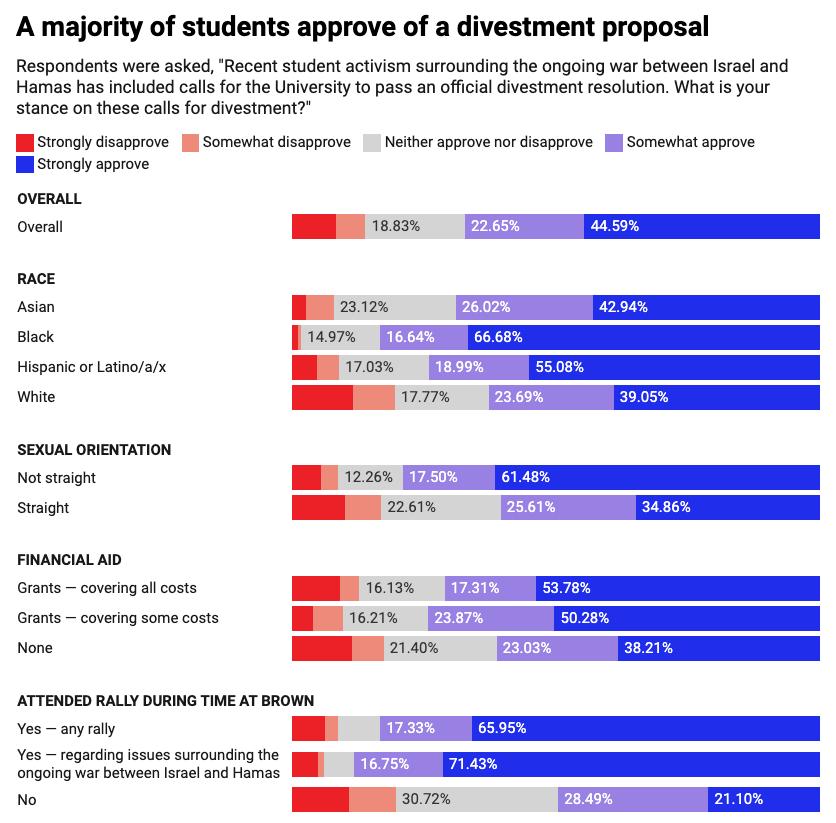
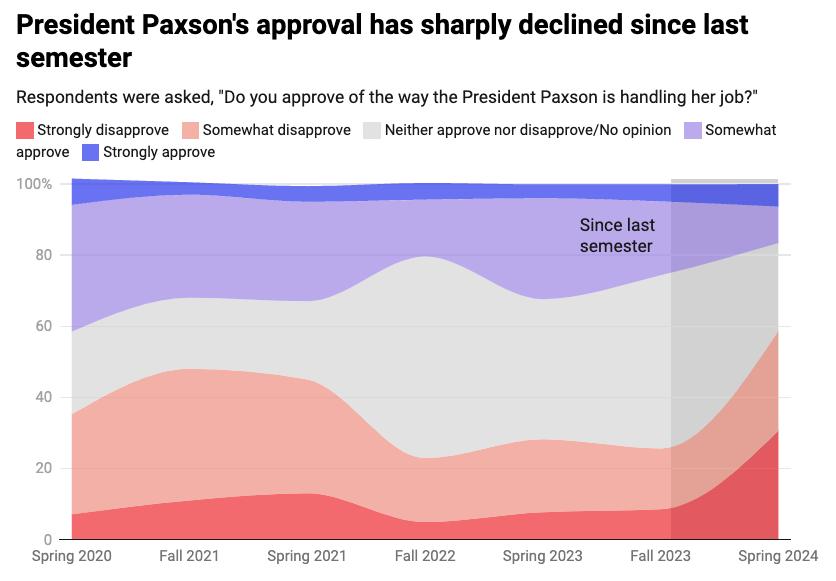
Administration approval
Paxson’s approval among respondents decreased since The herald’s Fall 2023 Poll. The Fall Poll was conducted between Oct. 10 and Oct. 12, three days after the start of the war between Israel and hamas, which began on Oct. 7. around 31% of spring respondents strongly disapproved of Paxson, a sharp increase from the approximately 9% of fall respondents who strongly disapproved. The percentage of pollers who had a neutral
or no opinion of Paxson decreased from 49% to 25% from fall to spring. additionally, those who either strongly approve or somewhat approve of Paxson has decreased from around 26% to 17%.
Overall, Paxson’s current approval is at its lowest — with her disapproval at its highest — since spring 2020.
Poll data shows that older students are more likely to perceive the administration to be very unreceptive to student input — including around 32% of the senior population. Only about a tenth of first-years consider
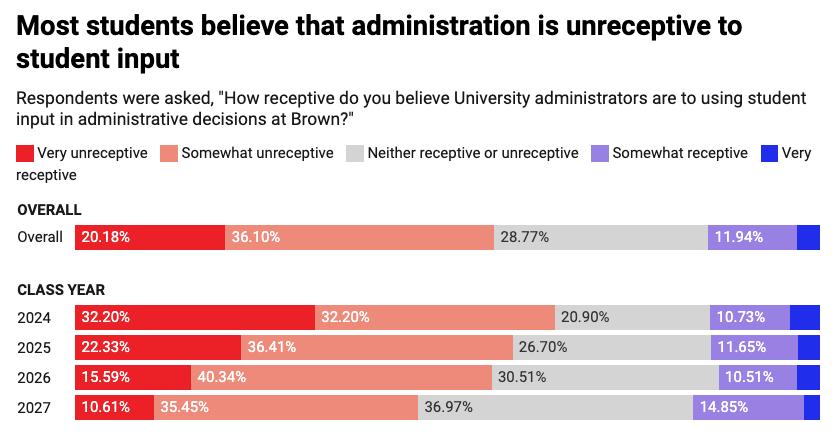
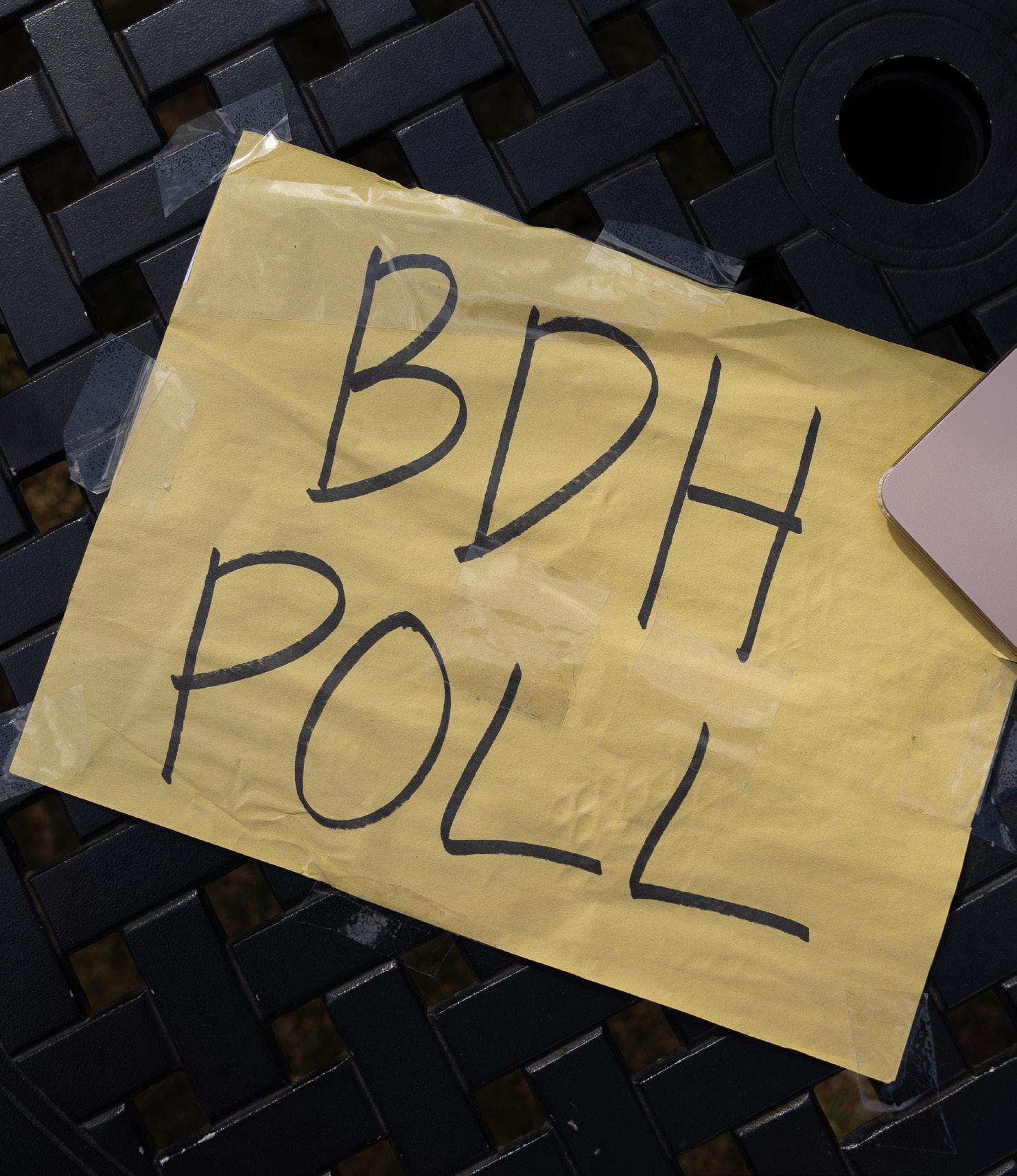
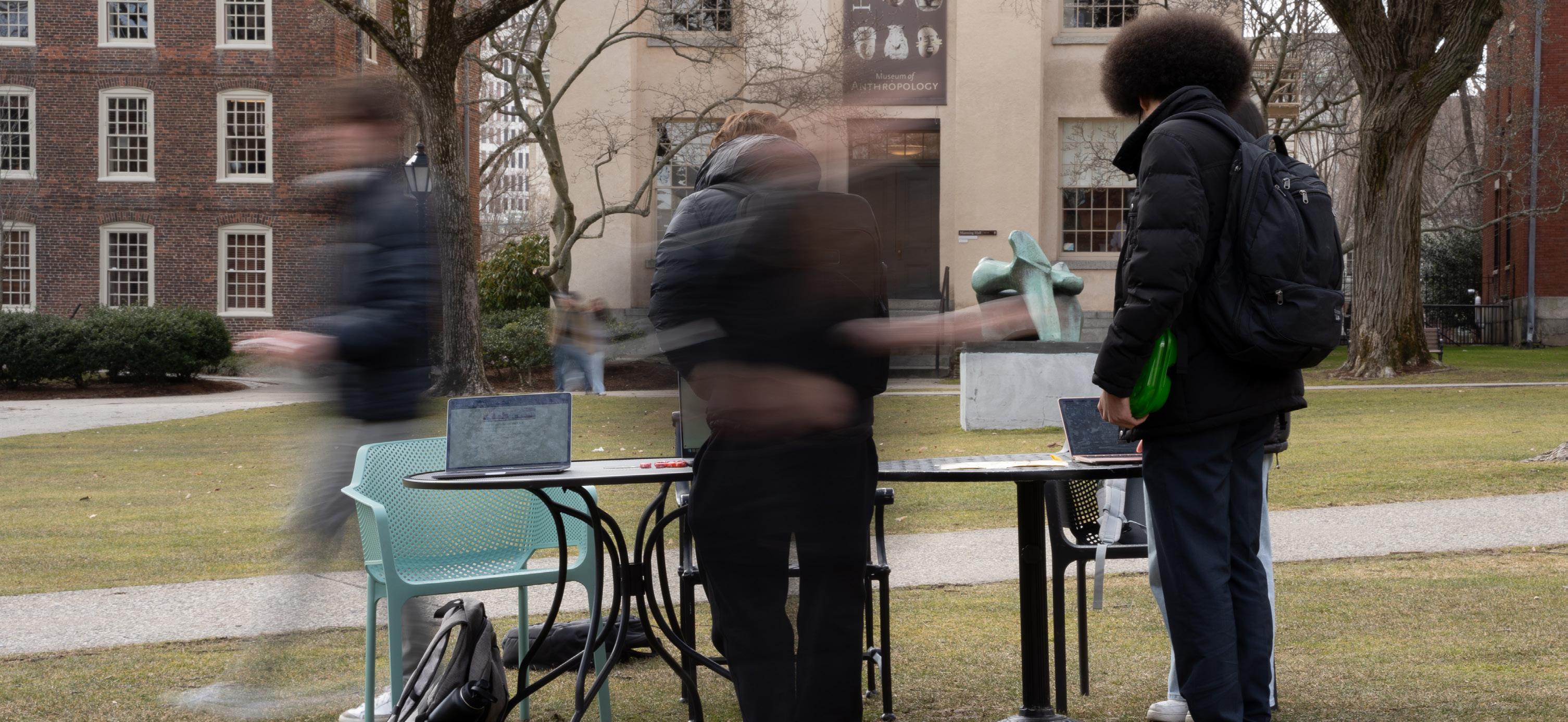
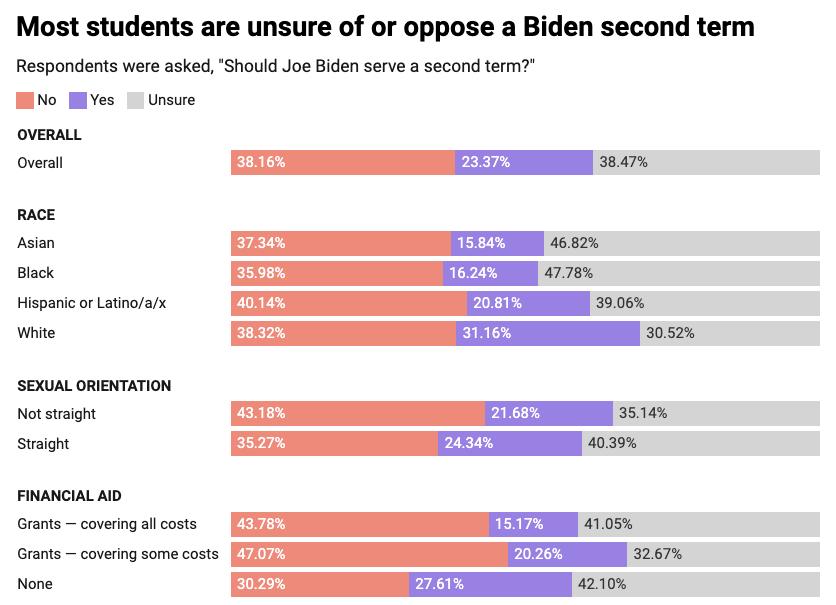
OWEN dahLKaMP aNd KELVIN JIaNG / crEaTEd WITh daTaWraPPEr
the administration to be very unreceptive.
Joe Biden’s potential second term
as the 2024 general presidential election approaches this November, american voters will likely be faced with a matchup they have seen before: Joe Biden vs. donald Trump. Nationwide, polling has shown Biden losing support among young voters and voters of color — two constituencies that were key to his 2020 victory.
The herald asked students whether they hoped that Biden would serve a second term as president. undergraduates seemed divided on whether the incumbent president should spend another four years in the White house. Over one-third of students hoped Biden would not run again, but a plurality of students were unsure of their opinion on a Biden second term. Only a quarter of students viewed this prospect fa-
vorably.
asian and Black students were more likely to answer “unsure,” while white students viewed him the most favorably. Those who are not straight and those on financial aid also viewed a second term less favorably.
Biden’s age topped the list of considerations for those unsure of or opposed to a second term. Both Biden, 81, and Trump, 77, would be the oldest serving president in american history if elected.
among those same student groups, Biden’s approach to the Israel-hamas war also weighed heavily in students’ considerations of their support for a second term.
Those who wanted to see Biden remain in the Oval Office largely cited his performance on issues related
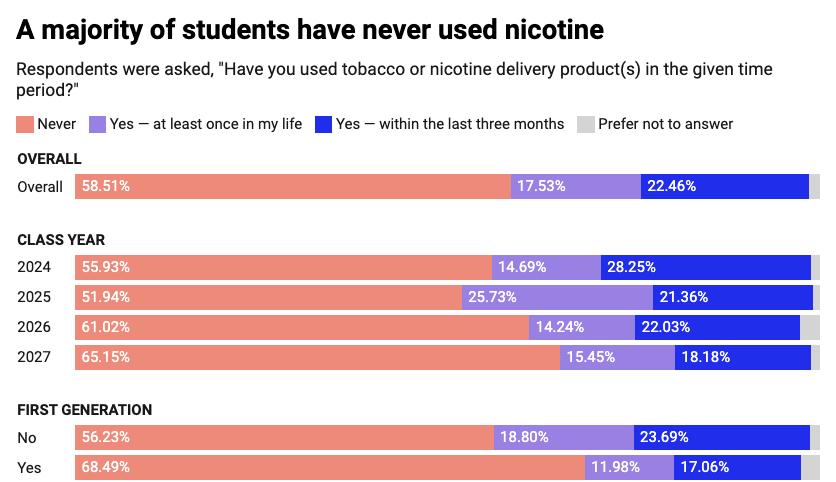
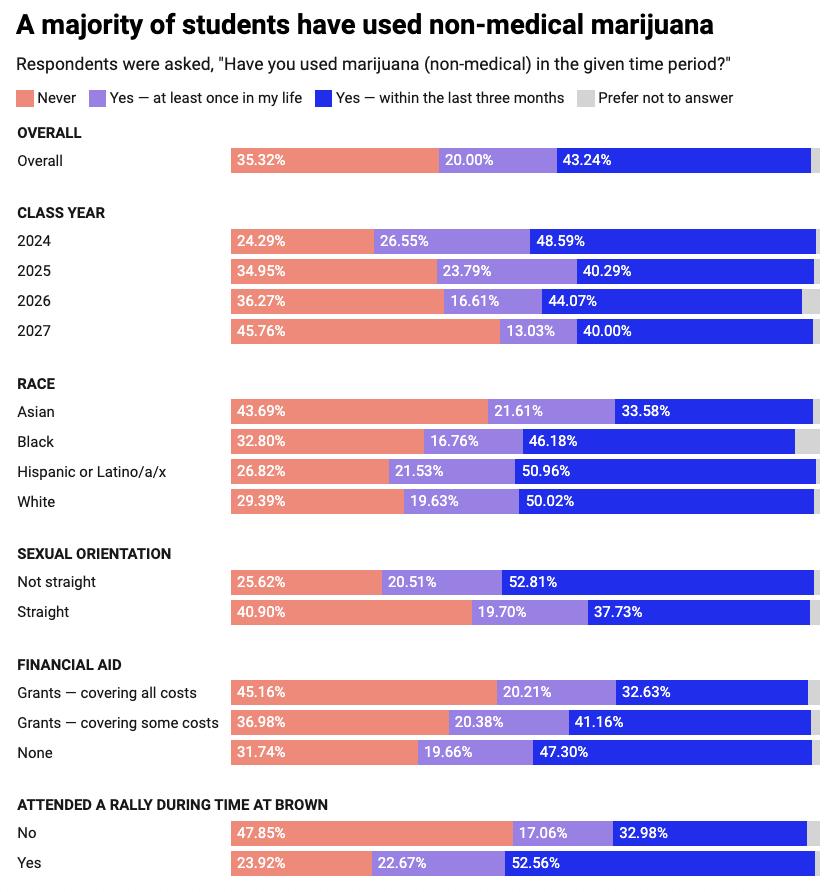
to climate change and reproductive rights.
Substance use among poll respondents, around 75% of seniors, 64% of juniors, 61% of sophomores and 53% of firstyears have used marijuana at least once in their life. a smaller portion of respondents — around 41% — have ever used nicotine.
Methodology
The herald’s semesterly poll was conducted between Feb. 27 and Feb. 29, 2024. all responses were analyzed and weighted by class year using r Version 4.3.2. Voluntary respondents were randomly sampled from the undergraduate student population at three polling locations around campus. The survey was
completed by students on a herald staff member’s device at these designated locations. during the afternoon of the second day of polling, The herald learned that a link to its poll — intended only for devices at designated polling locations — was shared outside to outside individuals shortly beforehand. The herald promptly closed the poll and identified an 18-minute interval during which unauthorized responses may have been submitted. all responses during this period were excluded from analysis. The herald used a rotating link to prevent further unauthorized access to the poll form.
This article originally appeared online at browndailyherald.com on March 12, 2024.

Cheney discusses American democracy, Trump, Jan. 6,
Liz cheney — former u s. representative for Wyoming’s at-large congressional district from 2017 to 2023 — addressed issues of democracy, donald Trump’s influence on the republican party, the Jan. 6 insurrection and the war in Israel and Palestine at the 103rd stephen a. Ogden Jr. ’60 Memorial Lecture on International affairs.
From 2019 to 2021, cheney was the chair of the house republican conference. she served as vice chair of the house select committee to investigate the Jan. 6 attack on the united states capitol. cheney’s new memoir, “Oath and honor,” details the events and her investigation of the Jan. 6 insurrection.
President christina Paxson P’19 P’Md’20 introduced the event and later led a Q&a cheney began her lecture by speaking about her experience during the Presidential Election in 2000 — one of the closest elections in american history — when her father, dick cheney, ran alongside George W. Bush as his vice president.
“When it was all over, Vice President al Gore gave what I believe is one of the finest speeches in american political history,” cheney said. she quoted Gore, saying, “our disappointment must be overcome by our love of country.”
“Too often we don’t stop and think about what it means to live in a nation characterized by the peaceful transfer of power,” cheney added. she noted that throughout american history, each president has respected this process.
“Every president has done that, until donald Trump,” she said.
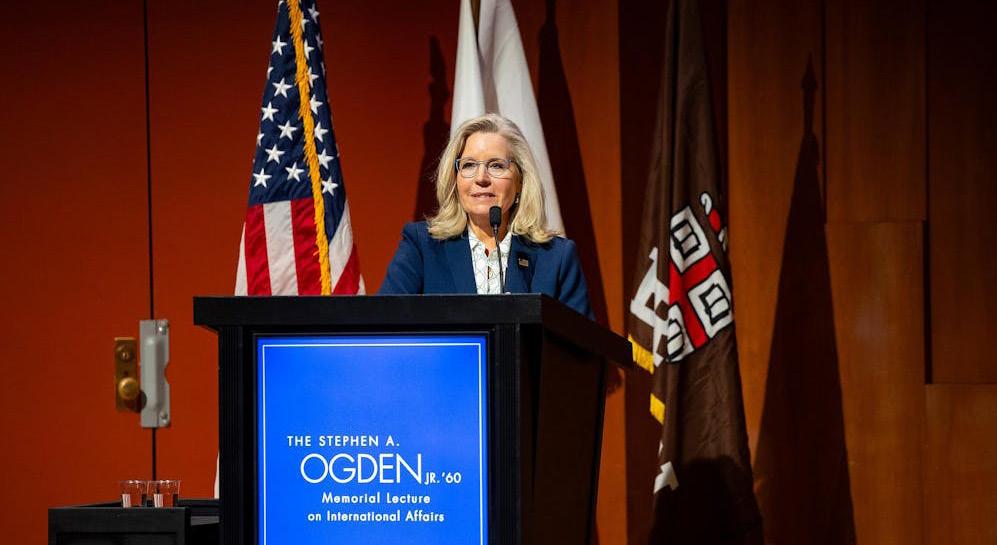
Trump is currently facing federal charges which allege that he worked to overturn the 2020 presidential election results. cheney emphasized the danger of Trump’s refusal to acknowledge the peaceful transfer of presidential power as “something we’ve never faced before.” she highlighted his inaction on the day of the insurrection, claiming that he failed to protect those at the capitol.
c heney said to the audience that Trump’s moves to delay proceedings in the criminal cases he is facing is an effort to “suppress the evidence” of his “indefensible” actions.
“We have an obligation to remember” that day, she added. “We have an obligation to tell the truth about what happened.”
cheney noted the hesitancy of many republicans in congress to oppose Trump in the aftermath of Jan. 6. she said that it is “incumbent upon all of us … to ensure that he never again is anywhere close to the Oval Office.”
cheney also addressed arguments proposed by conservatives that institutions will protect the country from any adverse actions Trump may take during a potential second term. In her view, Trump still has heavy influence in the american government even out of office.
“he is controlling what the republicans in the house and many of the republicans in the senate do on a daily basis,” she said. according to cheney, republicans in both chambers of congress refused to pass critical bipartisan legislation that would improve border security and provide aid to ukraine, Israel and Taiwan — because Trump “told them not to.”
regarding the upcoming 2024 presidential election in November, cheney urged the audience to “put partisanship aside.”
“Think about how important and how high the stakes are,” she said. We must “work above party to make sure that we defend our constitution and this wonderful country.”
after her lecture, the event shifted to a question and answer session led by Paxson.
Paxson began by asking cheney about her first-hand experience being in the capitol on Jan. 6.
cheney responded by describing the day’s events as “chilling.”
“I don’t remember being scared … I was very angry at my colleagues who had been pushing the lie,” she said, referencing the well-circulated idea that protestors in Washington, d c. would be able to change the outcome of the 2020 election.
When asked about her role as vice chair of the Jan. 6 committee, cheney emphasized
TEdxBrownu held its ninth annual con-
on March 9, exploring the theme “Mirage” in an event featuring five speakers and an a cappella performance by the chattertocks.
speakers delivered presentations on topics ranging from the importance of liberation through education to the possibility of space tourism. “Mirage represents the things that aren’t visible to our eyes, the things we realize when … we try to discover the deeper truth,” said claire Kim ’24, co-president of the 46-member TEdxBrownu
haleema aslam ’25 delivered the first talk of the conference, titled “Liberation Through Education.” aslam highlighted the importance of education as she discussed her journey from 15-year-old child bride to Brown student.
despite growing up in a tribe where girls rarely attended school, aslam learned to read and write, completing her high school education against her mother’s wishes. This commitment to education allowed aslam to earn a scholarship to a girls’ leadership program in New york, where she later applied for asylum.
“Believing in yourself, regardless of what your circumstances are … it’s going
the “non-partisan nature” of the committee’s work, adding that she was very proud of their efforts.
“When we can get back to spending our time debating policy, we’ll know … we’re back on solid footing in our democracy,” she said.
cheney also addressed the future of the republican party, speaking to the importance of a two party system that allows for debate through substantive discourse. she said that the republican Party may have to “start over again” after the 2024 election, given her concern about the party being “hijacked by a cult of personality.”
Paxson asked cheney about the effects of disinformation in the upcoming 2024 election, and donald Trump’s efforts to manipulate facts to his advantage.
“donald Trump has tapped into severely real concerns that people have, and he’s betrayed them,” she said. “he’s made people think he will be a voice to them.”
according to cheney, it is critical to be very careful about information that is spread on social media, and to “live in the truth and speak up for the truth.”
Following her initial questions, Paxson pivoted to ask cheney about her opinions on recent foreign policy concerns.
“any thoughts on prospects for peace in Israel-Gaza?” Paxson asked.
cheney noted her own support for Israel, stating that “there’s no context that justifies the slaughter that we saw on Oct. 7,” referencing hamas’s attack on Israel that killed 1,200 people and took an additional 250 hostage. at this remark, a portion of the audience broke into applause.
In Israel’s military retaliation, over 30,000 Palestinians in Gaza have been killed, many of them civilians.
she also emphasized america’s obligation to address foreign security concerns, specifically in the Middle East and russia. according to cheney, it is crucial for america
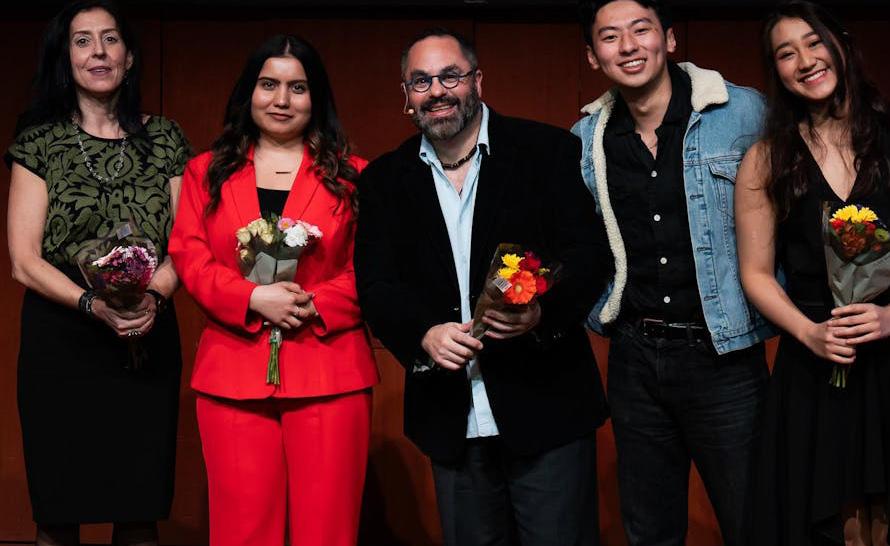
to take you so far in life. Never think that because the system is unfair, you can’t do something,” aslam told The herald. “When I think of child marriages, forced marriages, they’re still happening today. But when I think of my life — and I’m currently getting goosebumps as I’m saying this — I am so thankful I never gave up, because look at where I am today.”
aslam expressed gratitude for TEdxBrownu and her curation team, who guided her through the formation of her speech, for giving her an outlet to share her story.
“I knew I would share my story someday,” aslam said. “I just didn’t know if it would happen at Brown. I chose to give a talk this year because I felt ready, and because … I (realized) if I share my story, it will only inspire and uplift other girls and … tell them what a privilege it is to be free, to be pursuing an education.”
c hicha Nimitpornsuko ’27 gave a speech titled “Genesis: The untapped Potential of space Tourism,” in which she highlighted the future possibilities in the commercial space tourism industry.
to defend its interests and not “look the other way.” she voiced her concerns that under another Trump presidency, we will experience “a real unraveling of the global world order that has … helped defend freedom since the end of World War II.”
In response to a question from Paxson about cheney’s future plans, cheney said that she feels an obligation as a parent to ensure a democratic nation for future generations.
“I certainly wouldn’t rule out running for office again,” cheney said.
To conclude the event, Paxson asked a question submitted by a student about how young people can respond to “anti-democracy” in america and what actionable steps can be taken to work “toward that course correction.”
cheney emphasized the importance of voting and the influence that young voters can have on elections. “We all have that power, and we have the obligation to fight to keep it,” she said.
Oscar Low ’25 attended the event because of his interest in cheney’s “anti-Trump stance,” despite her conservative politics. he said that it was fascinating to hear her speak about the importance of “preserving the framework of this country,” regardless of political differences.
But, for Low, cheney’s talk only “described the problem,” and did not “speak to the root of the problem.” he emphasized how misinformation in the media can influence voters. “People are being divided more and more, and I don’t think Liz cheney really spoke to that,” he said.
Brooke ury ’24 particularly appreciated cheney’s eloquence in her lecture. “I have a lot of respect for Liz cheney,” she said. “I think she’s a really important voice, considering how polarized everything is.”
This article originally appeared online at browndailyherald.com on March 12, 2024.
ows of the Psychedelic renaissance,” by reciting recent headlines that lauded psychedelics as a cure-all for the suffering of millions. But “the psychedelic revolution is built on a foundation of mass looting and lies,” Faudree said during her speech.
Informed by her time in the sierra Mazateca in Oaxaca, Mexico, Faudree outlined how centuries of Indigenous experimentation revealed which plants were edible or psychoactive. The use of plants like salvia divinorum, which contains psychedelic compounds, by Western pharmaceutical companies “erase(s) the perspectives and contributions of the sierra peoples,” she added.
upegui spoke about how the birth of his son, who has down syndrome, “showed (him his) value system was a mirage.”
“I thought this topic was just too good not to share,” Nimitpornsuko told The herald. “I’ve been doing astronomy for a while … This is my passion, this is why I came to the u s. (and) why I came to Brown, so it’s basically default for me at this point.”
Other speakers included david chu ’24, who highlighted barriers to growth in the secondhand fashion industry, as well as associate Professor of anthropology and Linguistics Paja Faudree MFa’92 and david upegui, an adjunct lecturer in education.
Faudree began her talk, “In the shad-
From growing up in Medellín at the height of drug cartel activity to “working at one of the most prestigious institutions in the world,” upegui valued academic success — and he expected his children to do the same. But his son’s birth showed him the limitations of judging people purely on academic metrics, upegui said.
“The human spirit shines brightly in unexpected corners,” said upegui.
attendees praised the event for being inspirational and informative.
“The first and last speeches (inspired us) to follow our dreams and to view life as an opportunity to excel,” Petros Gkenos ’27 told The herald.
This article originally appeared online at browndailyherald.com on March 10, 2024.